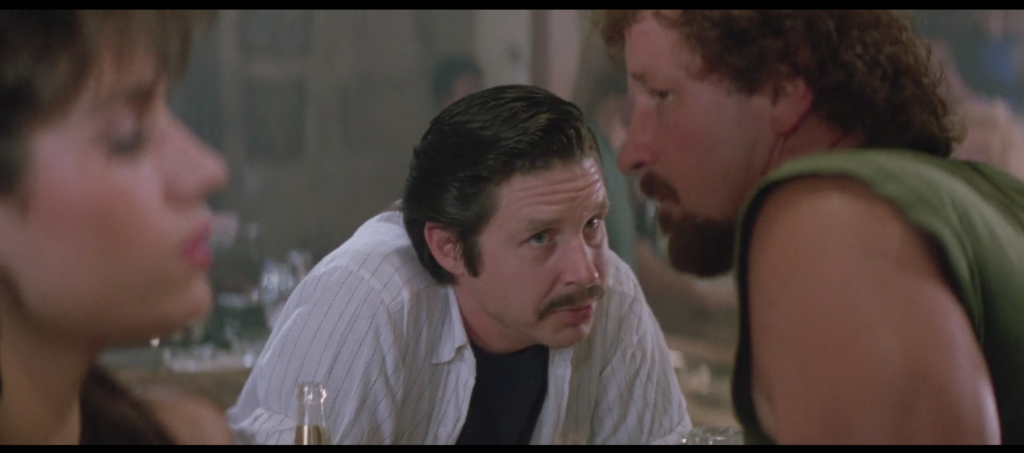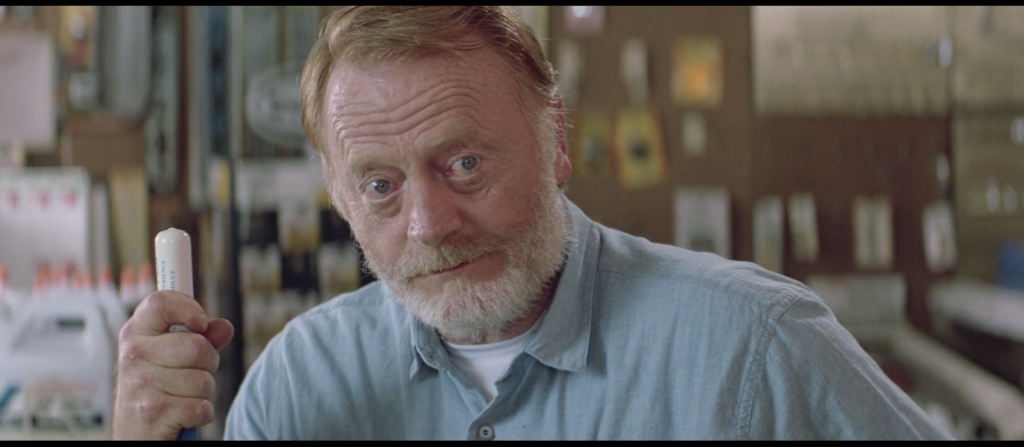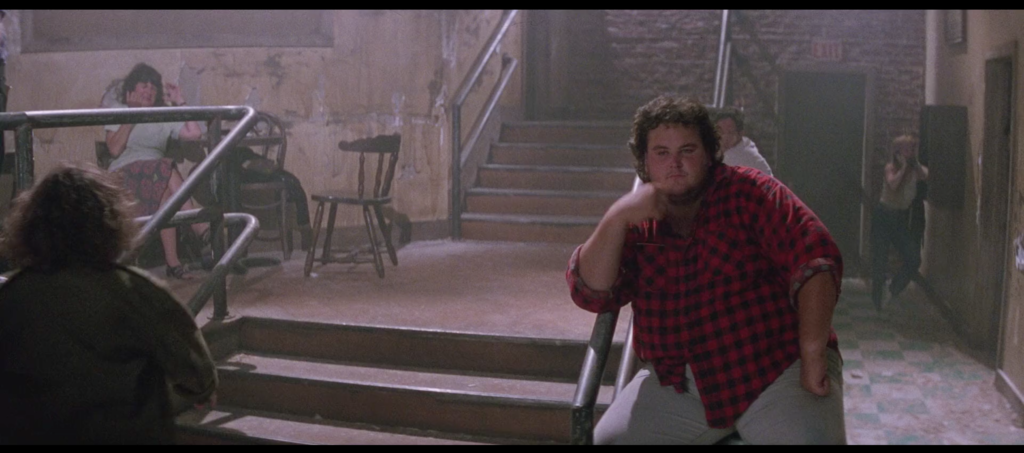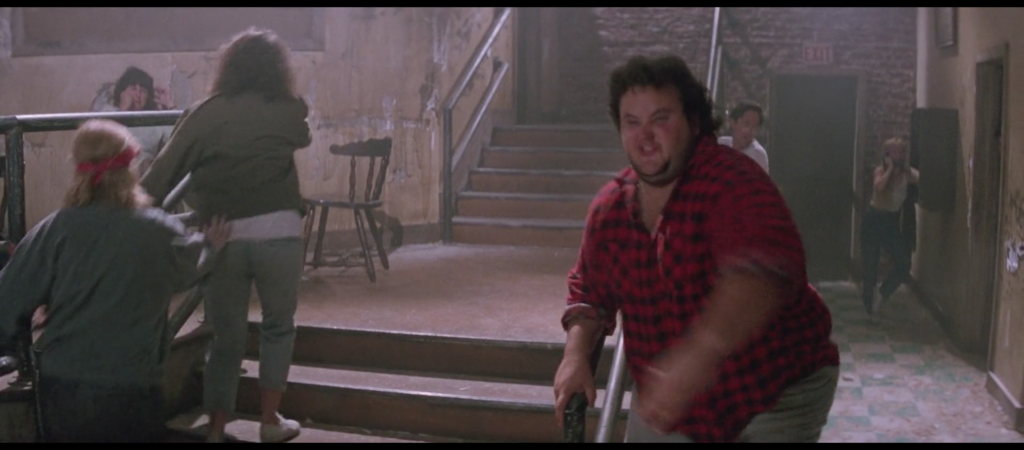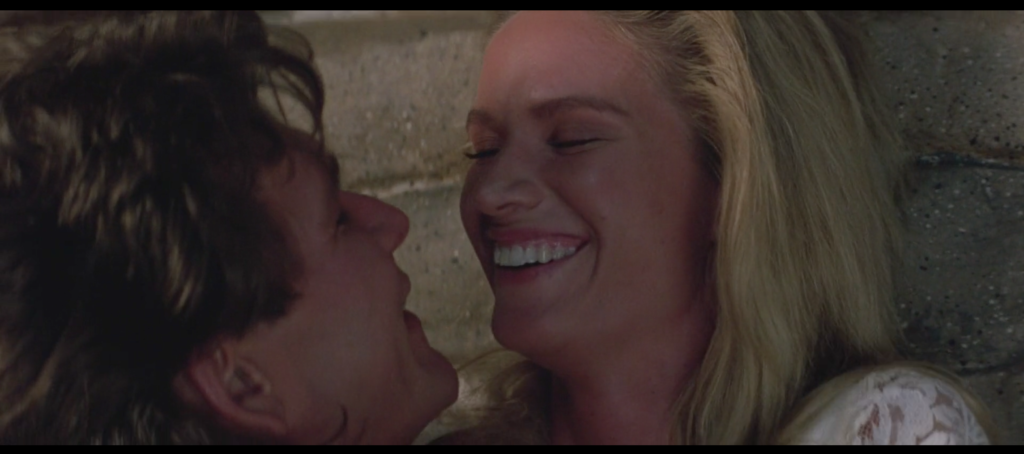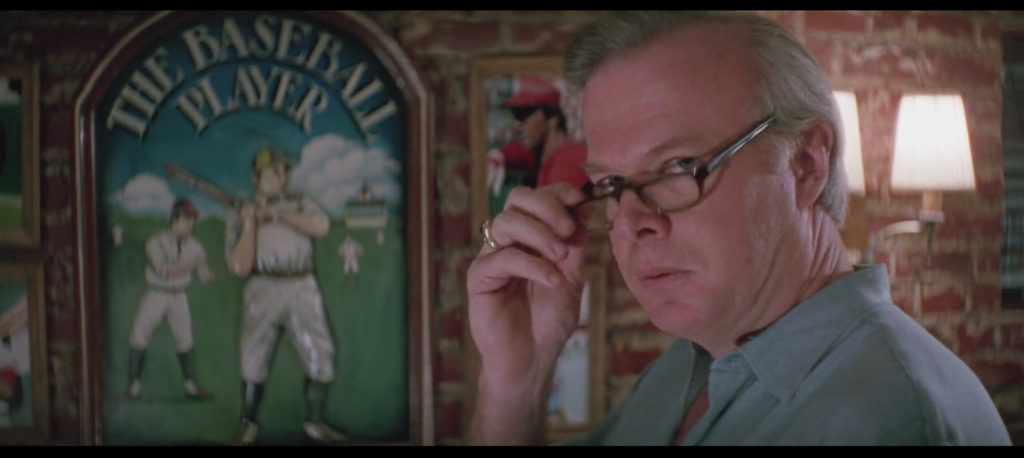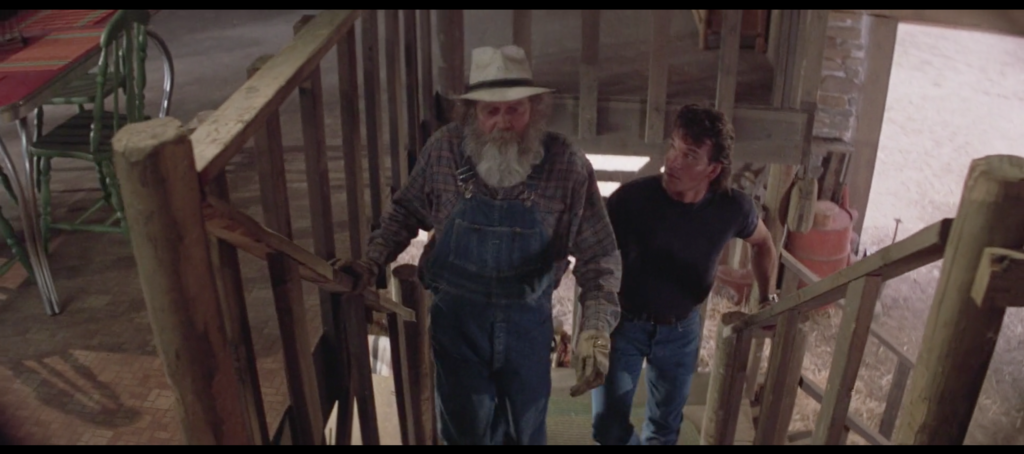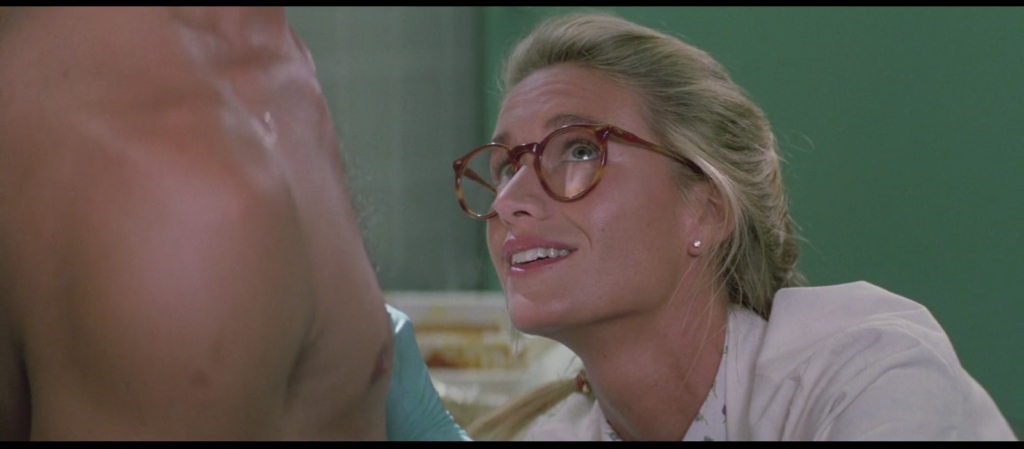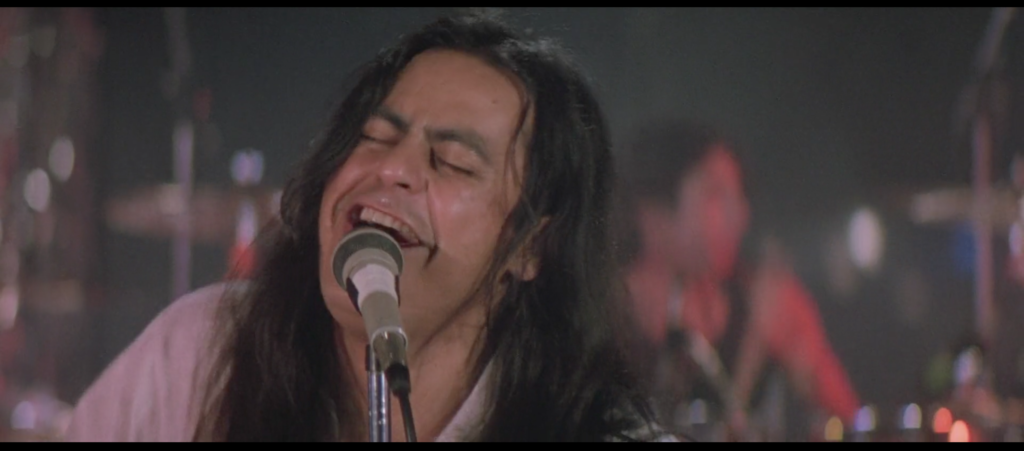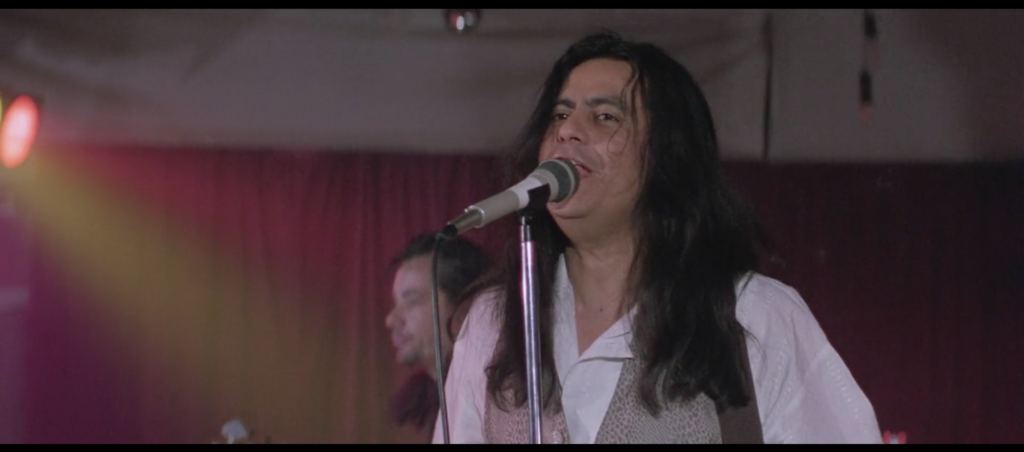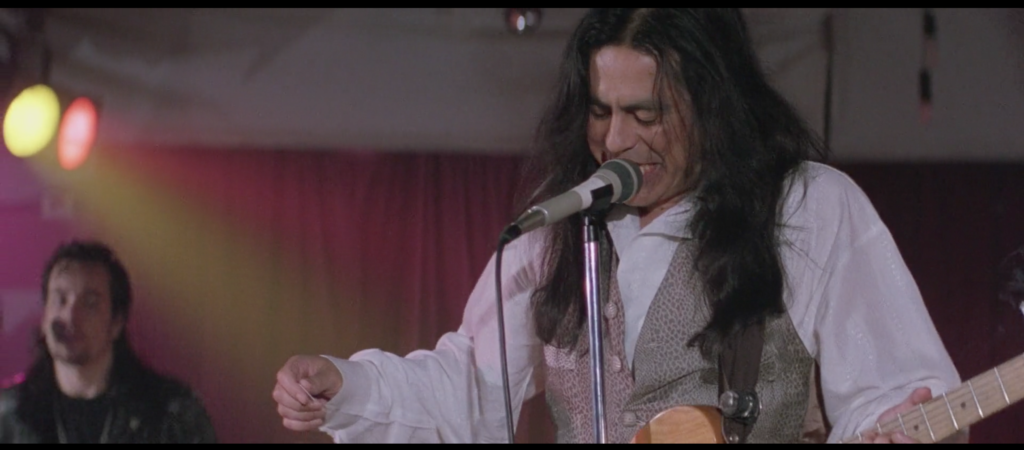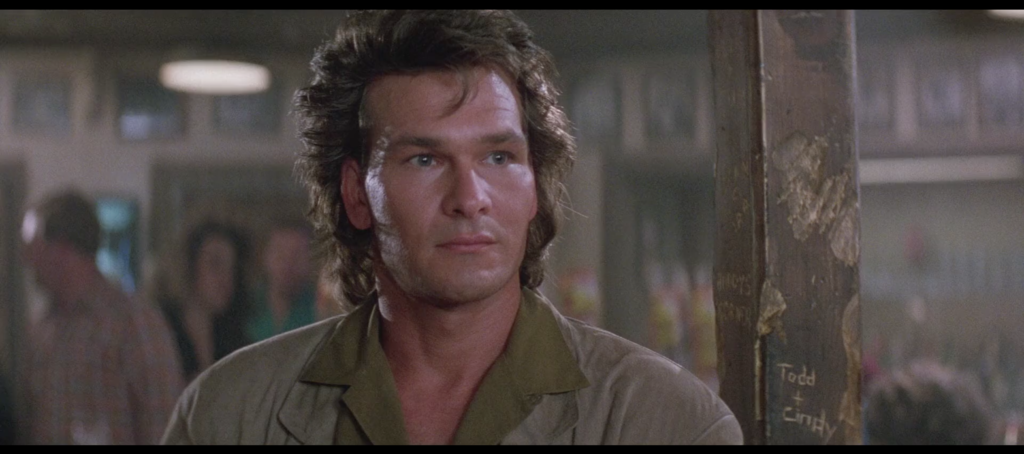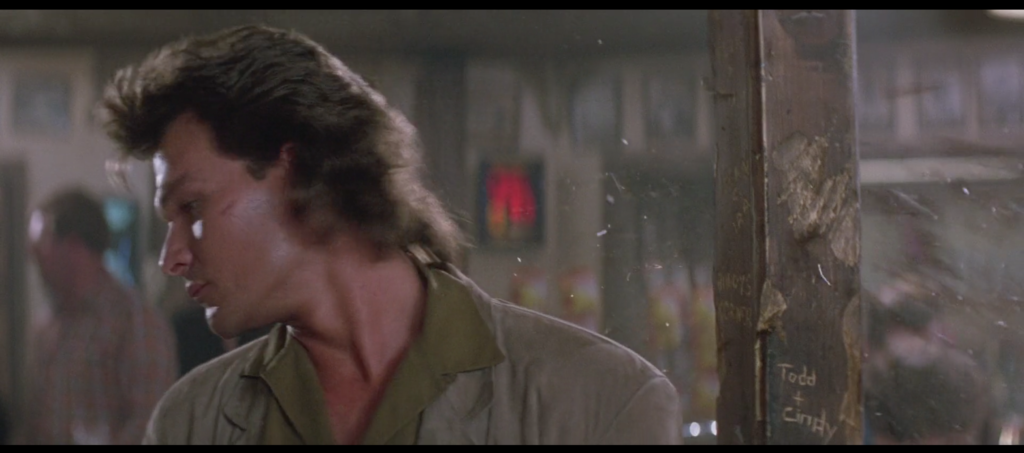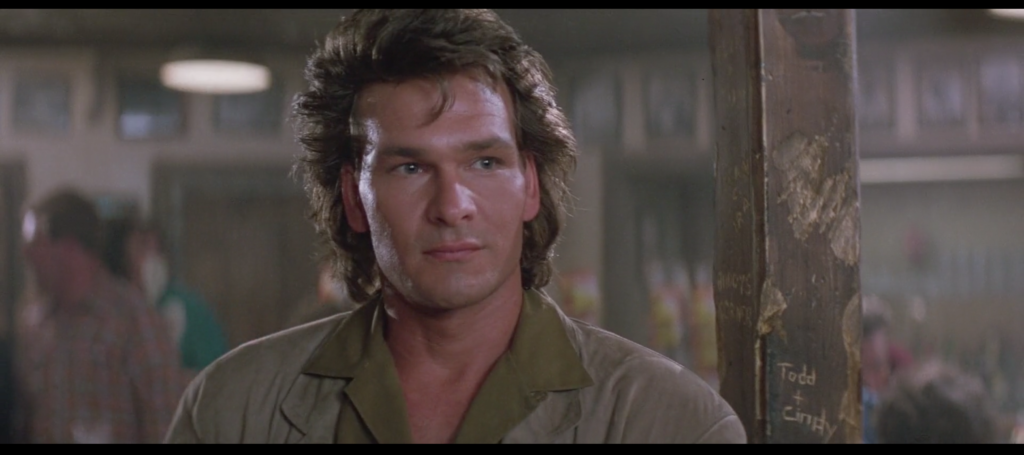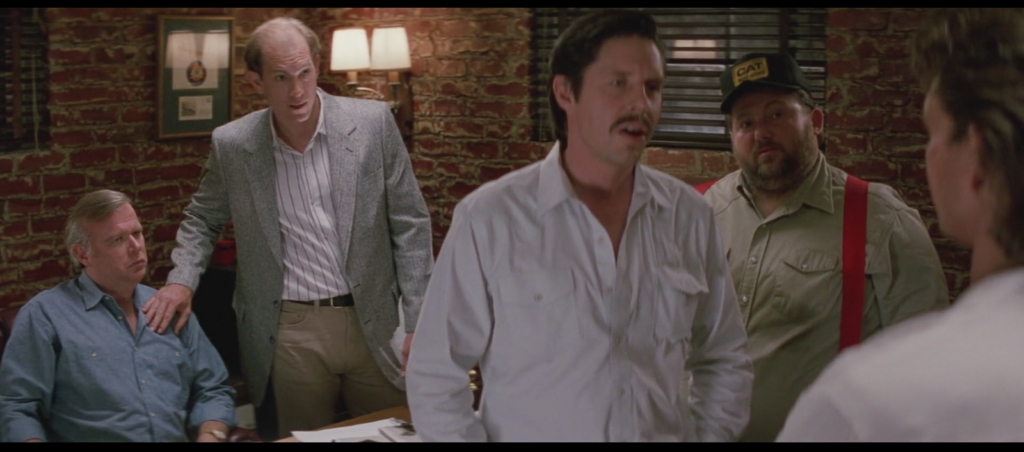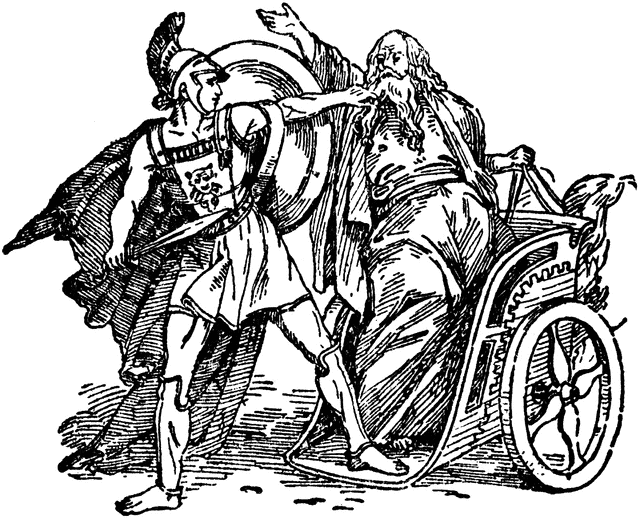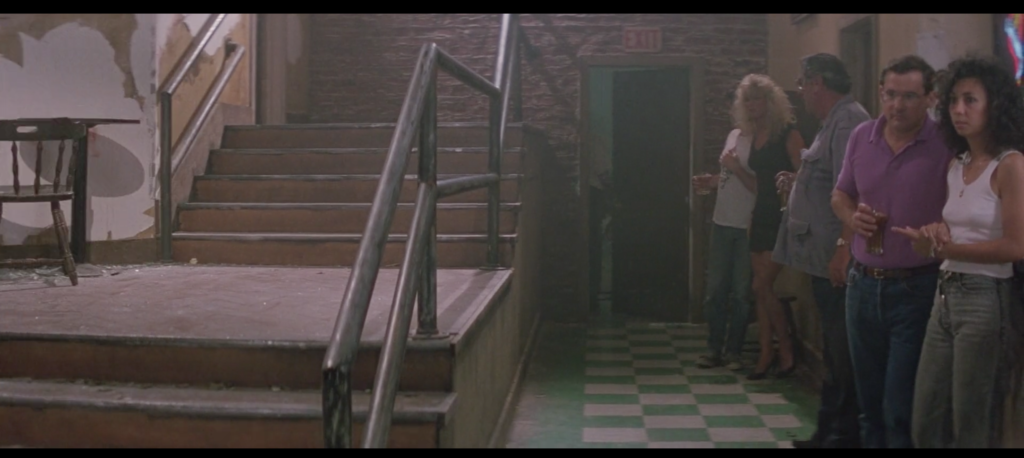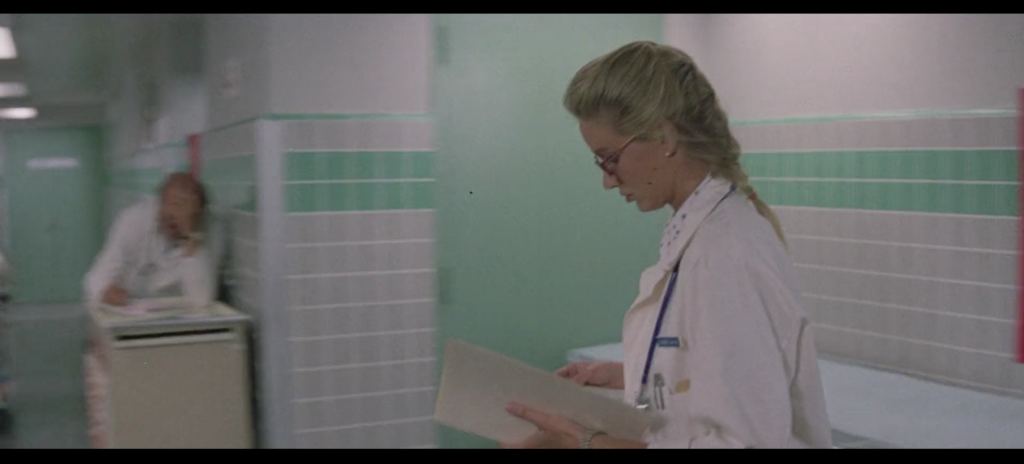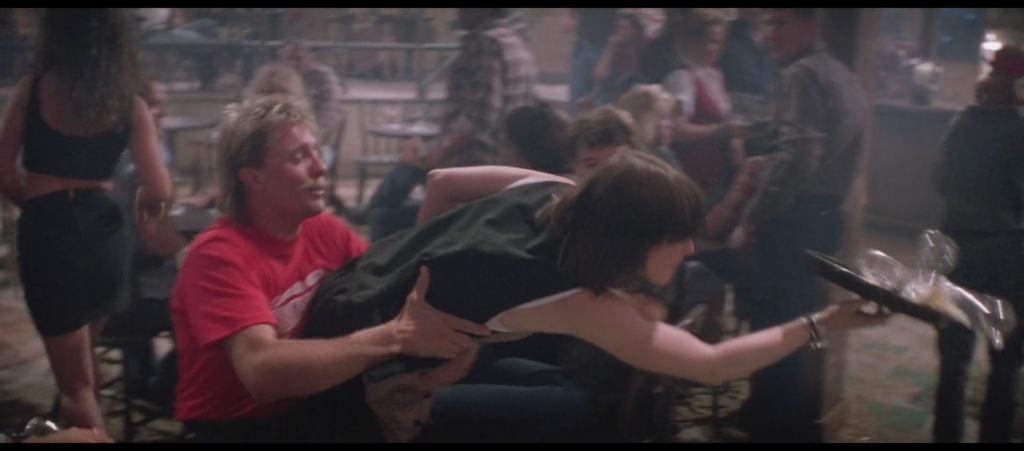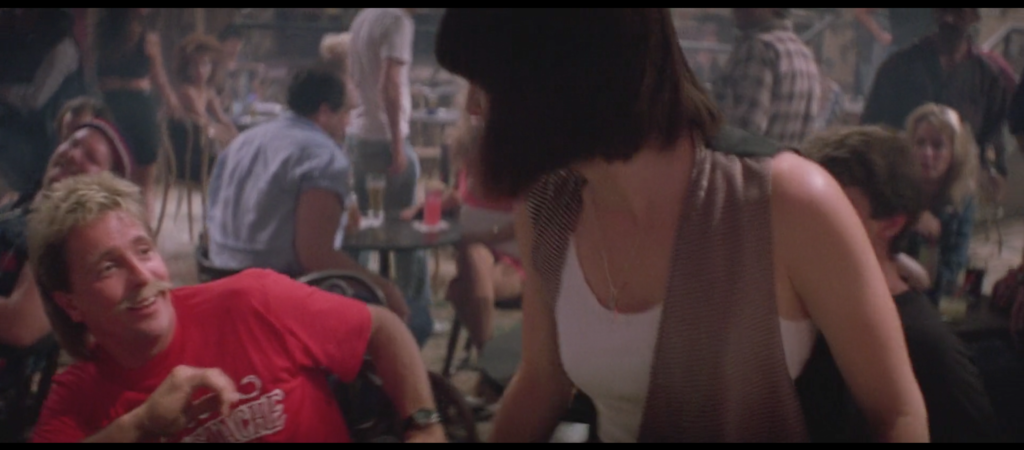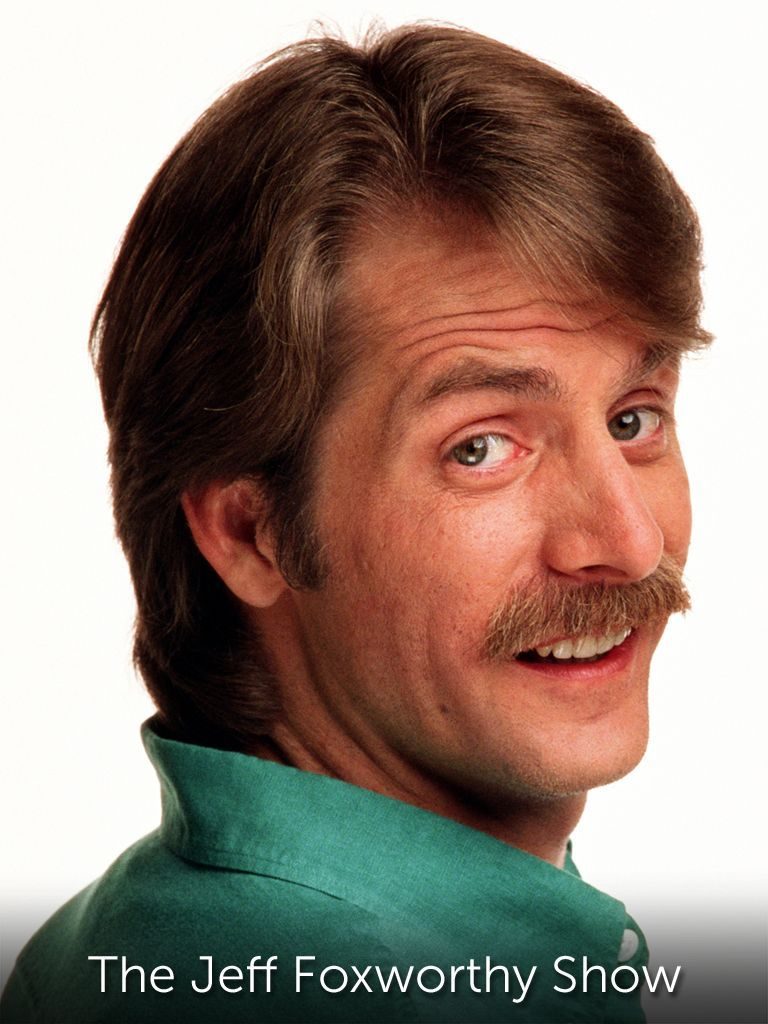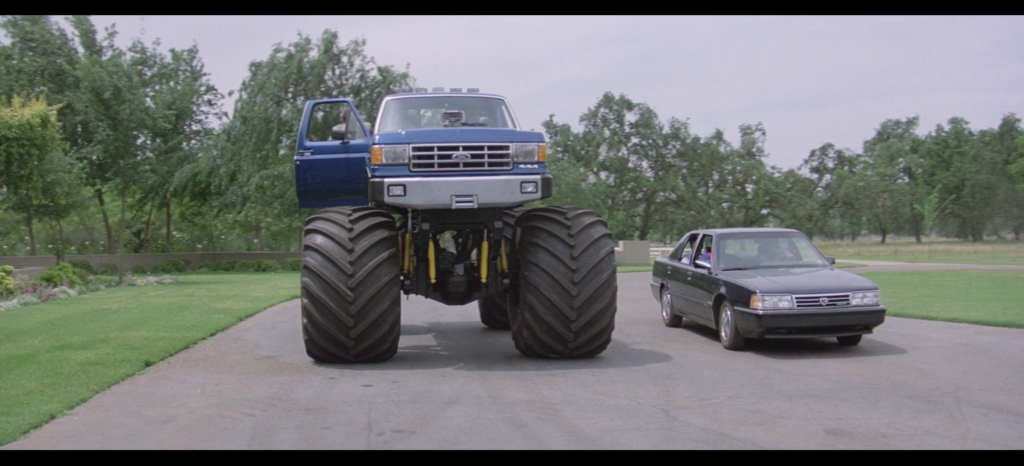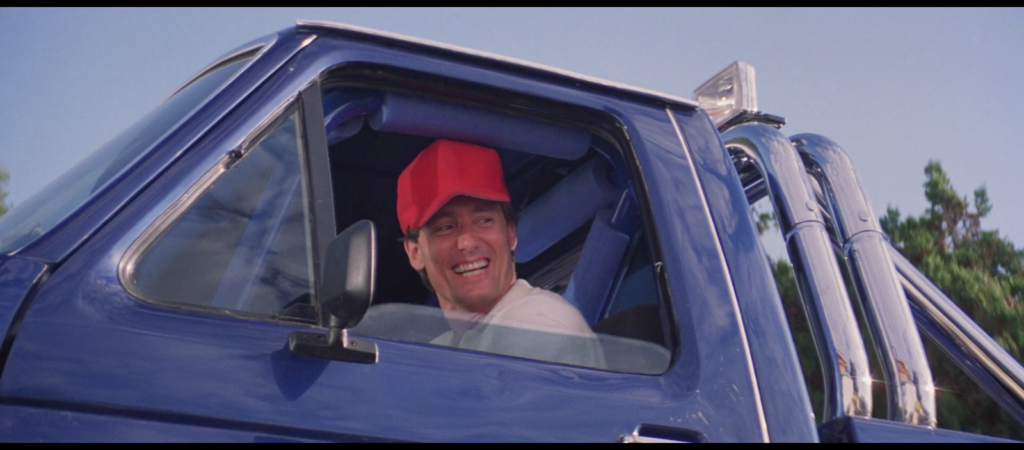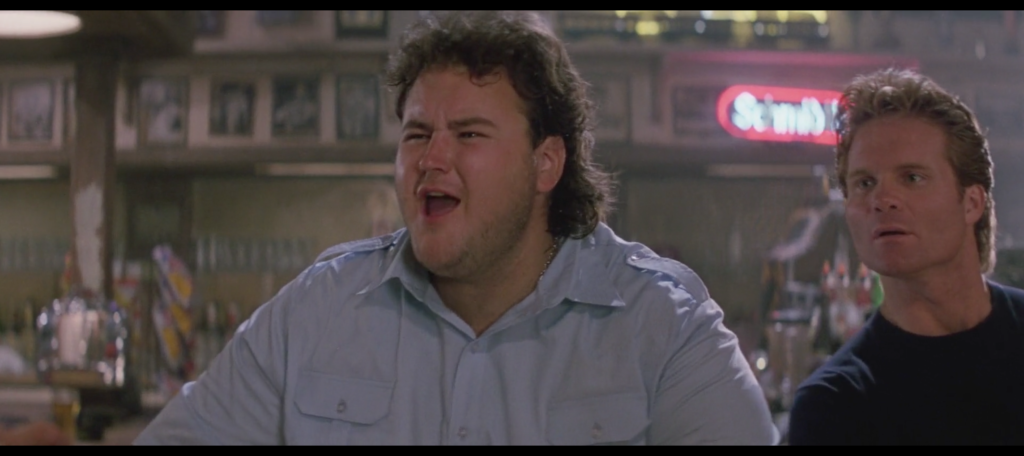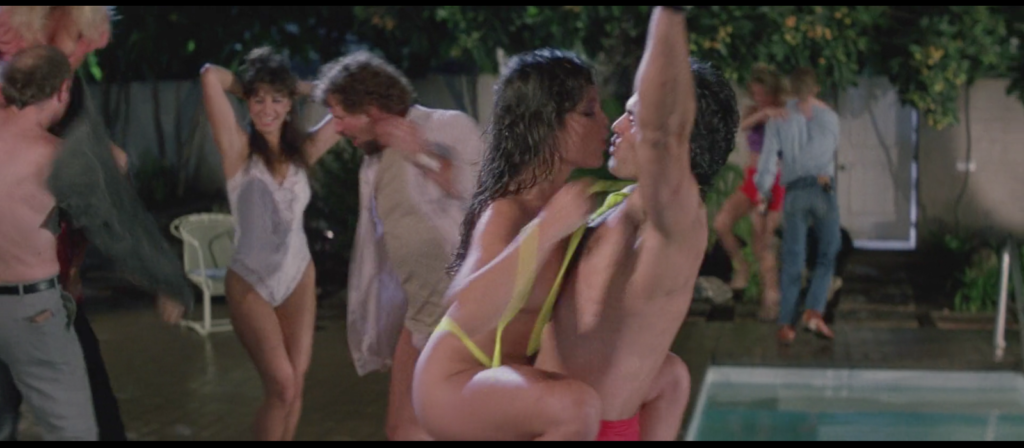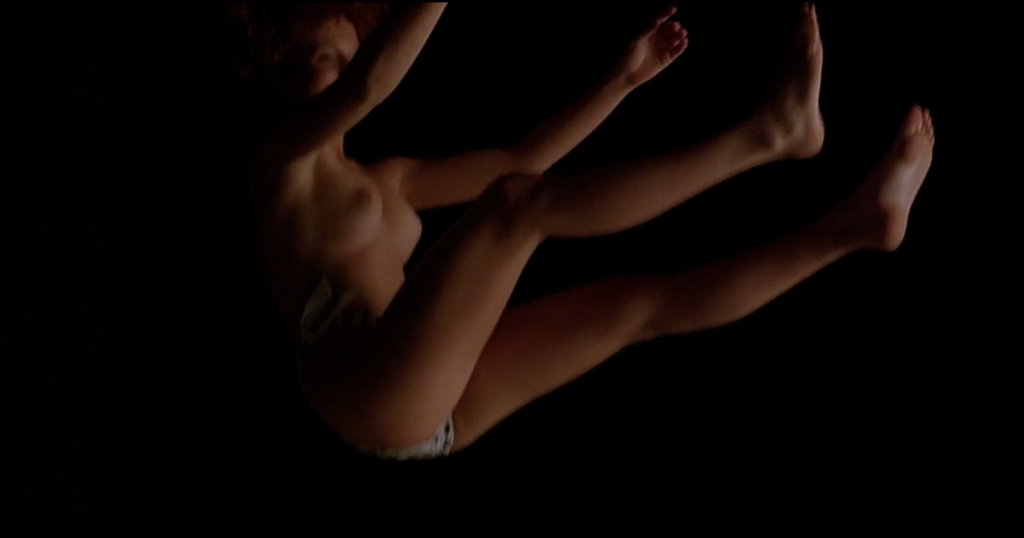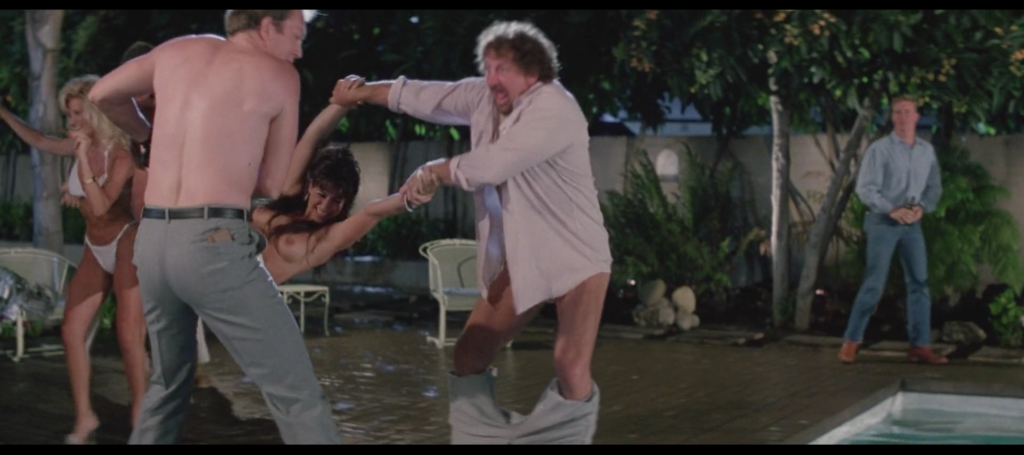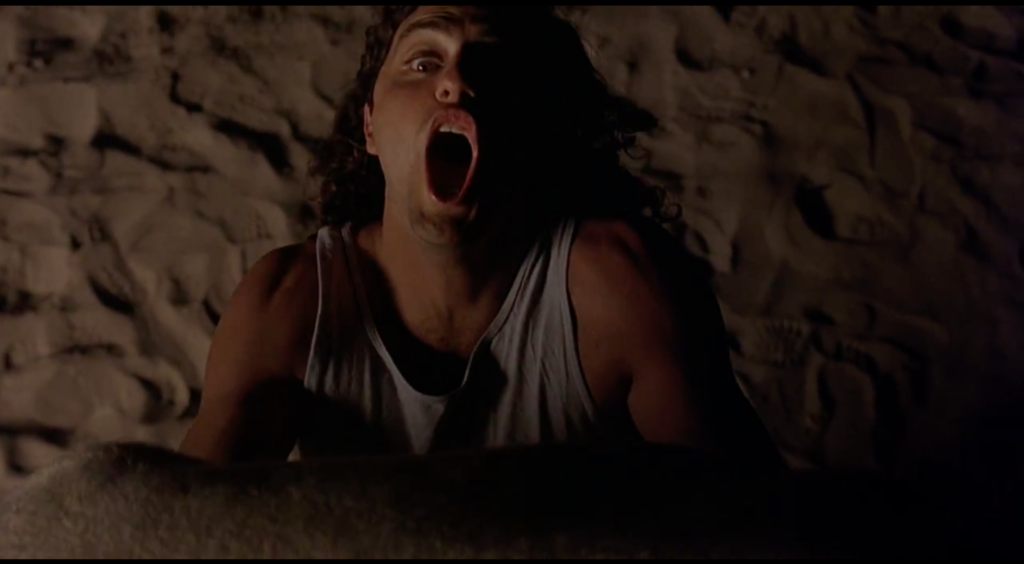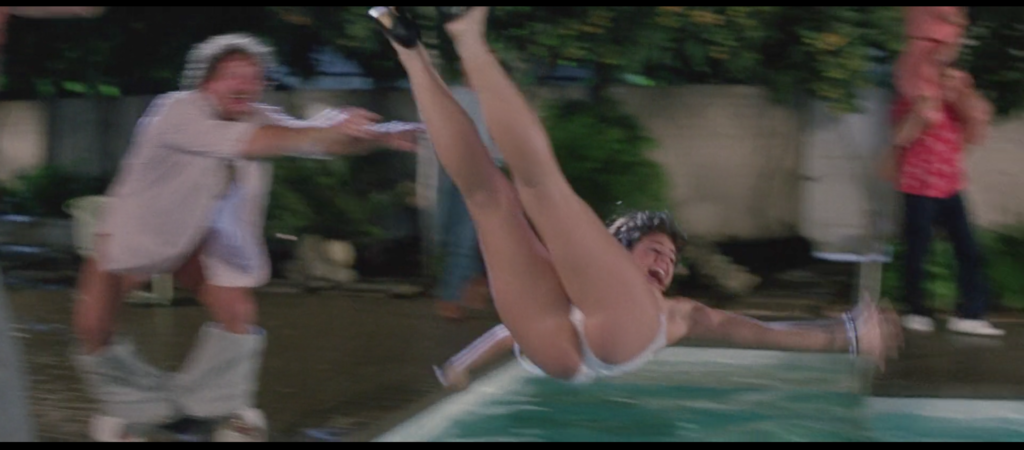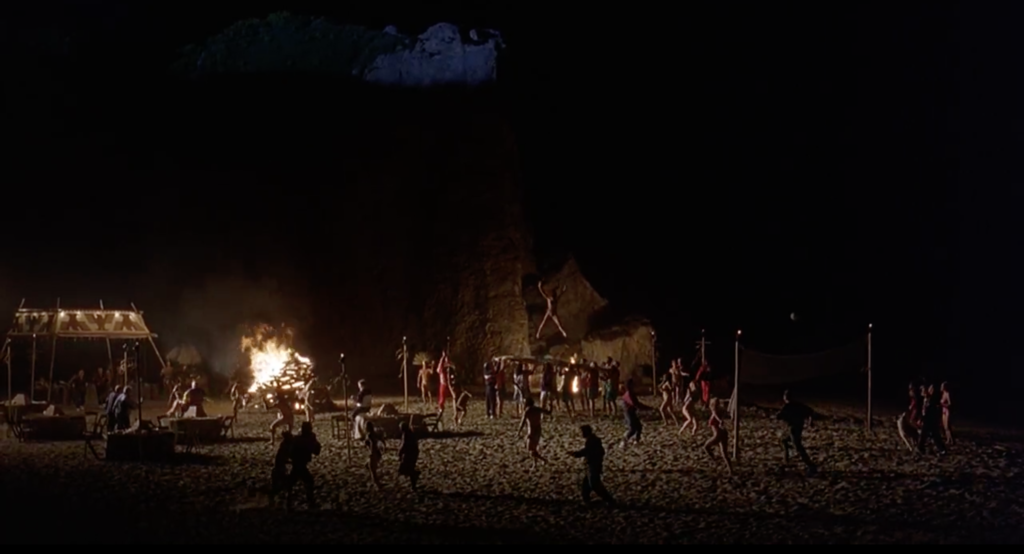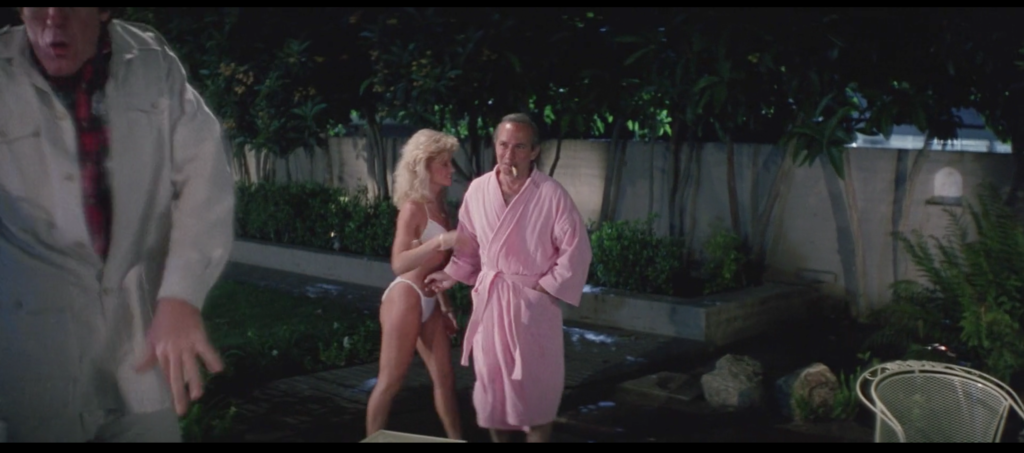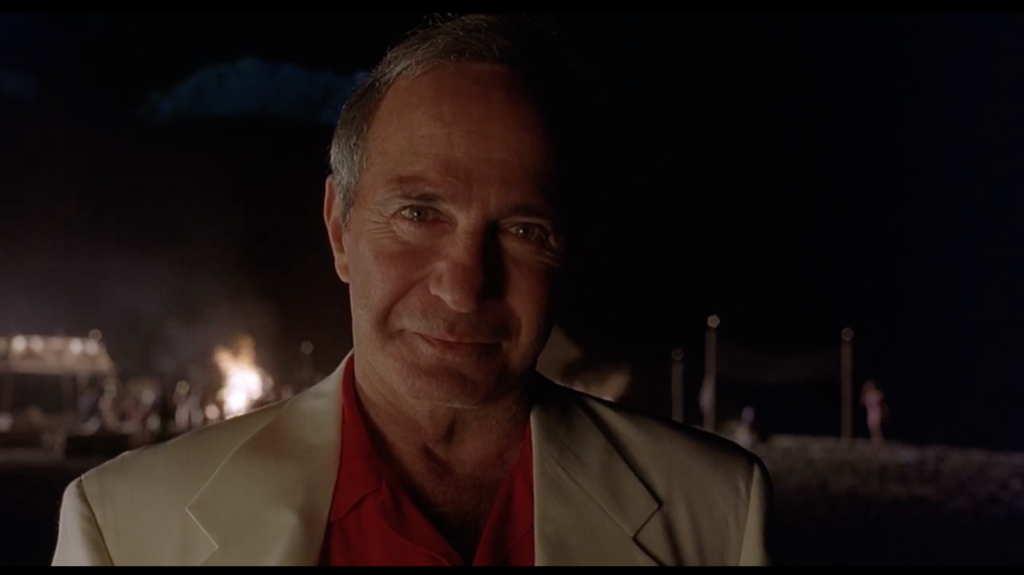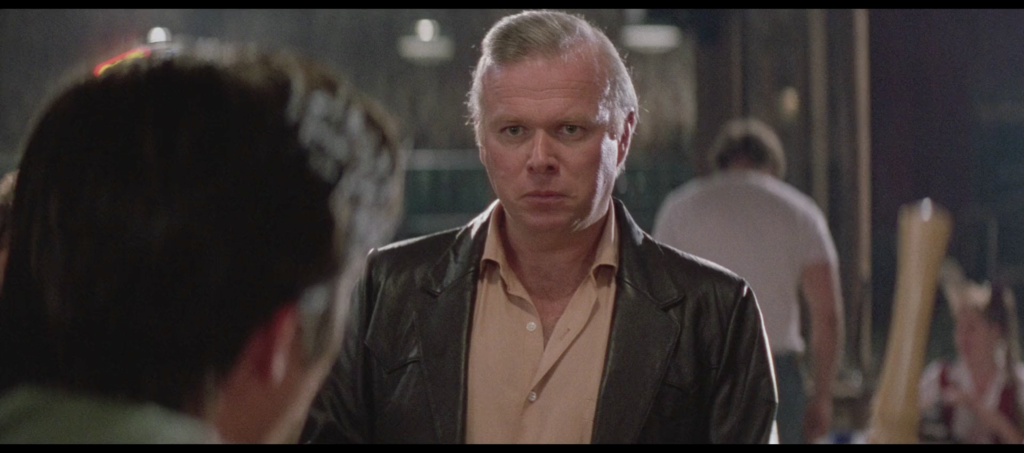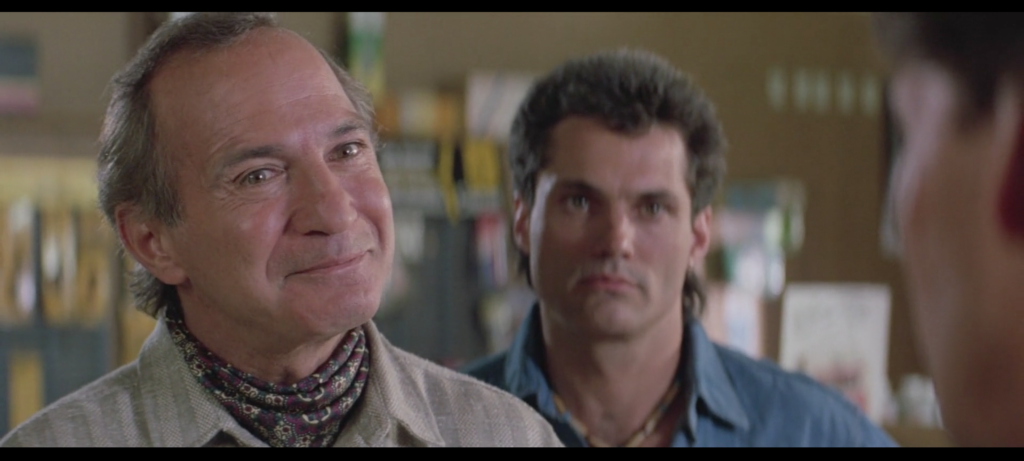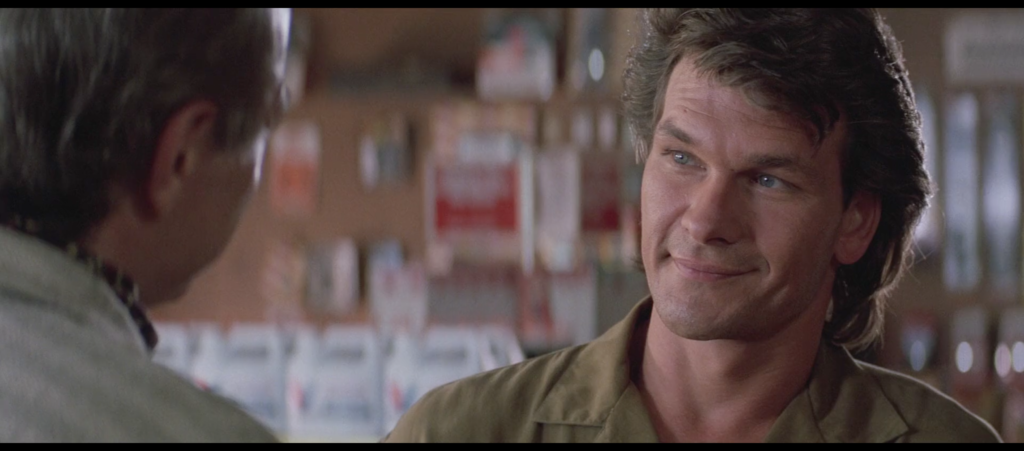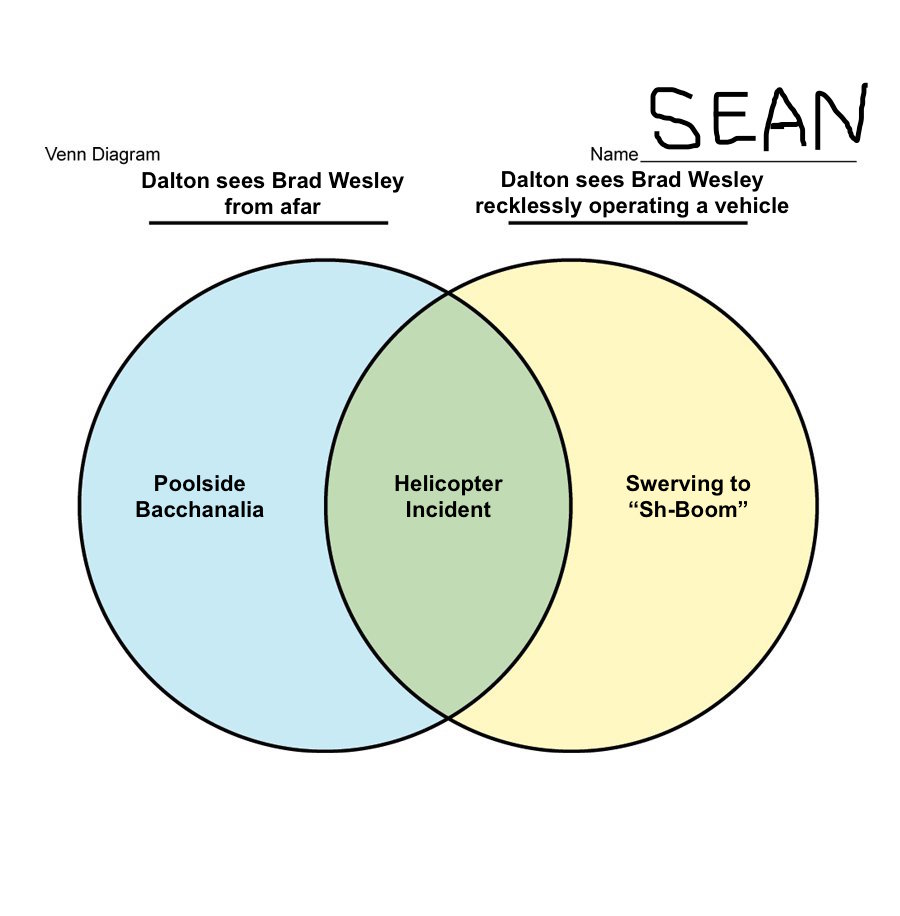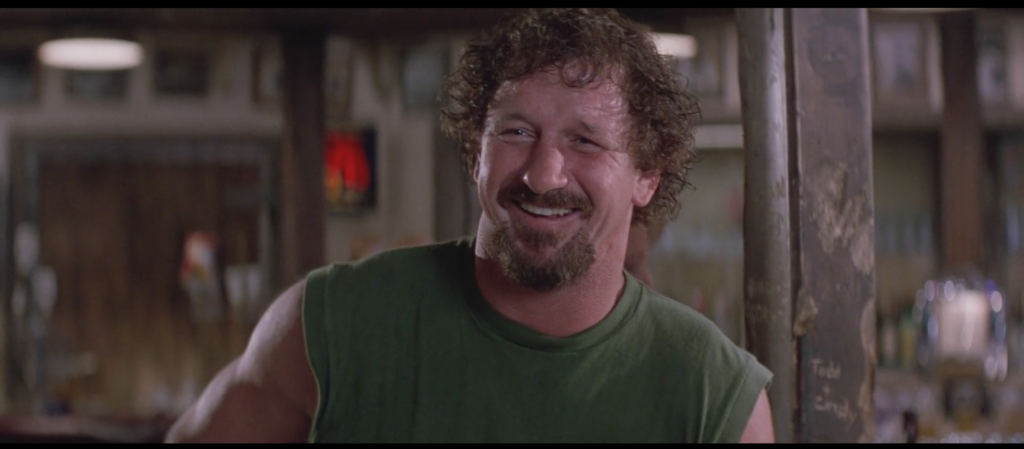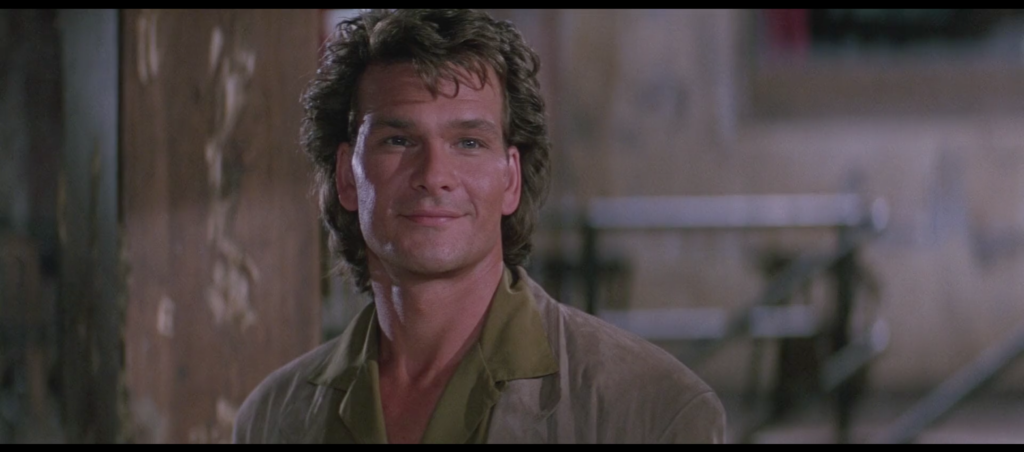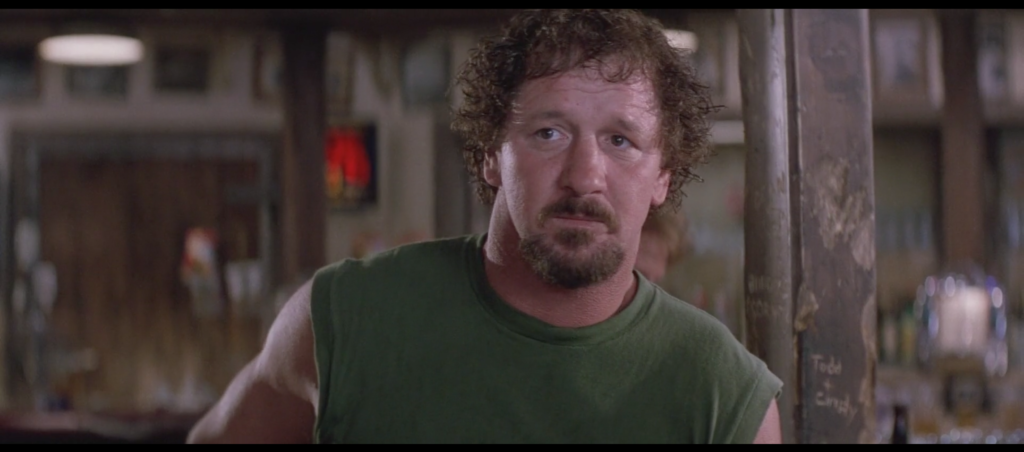Posts Tagged ‘road house’
089. Whisper
March 30, 2019By this point in the evening the word has begun to spread. Dalton has told Carrie Ann, and she’s made a huge fuss, at least partially within Pat McGurn’s earshot. She’s since gone on to report it to Hank, like a little girl telling her brother on Christmas morning that Santa came. Hank is about to tell Steve the story of the throat-ripping incident, and Steve will pronounce it “bull shit.” For now, Pat must report the news to his partner in Brad Wesley Enterprises, Morgan. He does it in low tones, as befits a bearer of ill news:
“That guy at the end of the bar is fuckin’ Dalton, man.”
Pat’s whisper is as the footsteps of doom: He’s just introduced Morgan to the man who will murder them both, so that Red’s Auto Parts and Stroudenmire Ford might live anew.
But it’s not foreknowledge of their fate that has knit lines of worry across Pat’s brow, or rendered Morgan’s strangely adorable face a soft Winnie-the-Pooh mask of concern. Dalton’s reputation precedes him. Like nearly all of the Double Deuce’s barfolk, they’ve heard the legends; even the slackasses and shitkickers on Frank Tilghman’s payroll would have a hard time looking themselves in the mirror (okay, maybe not Steve) if they had not kept abreast enough with the trade to be aware of the second most famous bouncer in these United States. If your role at an establishment that has hired Dalton is to practice throwing human beings through furniture (as is Morgan’s) or draw a bartender’s paycheck at your uncle’s insistence while stealing, in 2019 dollars, over $300 a night (as is Pat’s), this is bad news indeed.
Pat, at least, has the good sense to brown up a bit, calling Dalton “buddy” and asking his name, though he already knows it, and though Dalton only says “coffee, black” in response because he’s a bit of a prick, at least before he’s officially being paid not to be. Morgan, you’ll recall, barely manages to titter his way through an icebreaker involving the size of Dalton’s balls, which is saying the quiet part loud if you ask me.
These guys are desperate to be noticed, and desperate to not be noticed. They want to make themselves seem too pliant or too tough to actually be crooked, and hope Dalton doesn’t look any closer. Which is to say they may know who Dalton is, but they have no idea who Dalton is. This is the (second) best damn cooler in the business, you fools. You’re already dead.
088. Hobbyhorse
March 29, 2019Few of Road House‘s many would-be idioms and aphorisms are afforded as grand a debut as, arguably, the dumbest of them all. You can thank Red West, the actor who plays Red Webster (you can’t spell “Red Webster” without “R-E-D-W-E-S-T”), for that. The man sells every line of down-home wisdom and ain’t-that-a-kick-in-the-head fatalism like Pete Stroudenmire sells roomy family-friendly vehicles during Wagon Days. You can of course also thank Rowdy Herrington, the film’s director, and John F. Link and Frank J. Urioste, the film’s editors, who grind everything to a halt so Red can deliver it almost right into the camera before a hard cut to the topless bar where we first meet Wade Garrett. The line all but takes off its own top and dances around on stage in a g-string, that’s how much attention it gets.
Ah, what line, you ask, and I’m glad you did.
Picture it: Jasper, Missouri, 1989. A young cooler, new in town, visits the small business owned by Red Webster, uncle of the most beautiful woman he’s ever seen. Red keeps a black and white glamour shot of his niece on the wall of his workplace, piercing the young cooler’s heart, and raising more questions than it answers. On the way into the store the cooler passes by two extremely handsome goons, who stare at him and smile, like crocodiles eyeing a wildebeest at the watering hole, or like Brad Wesley looking at literally anything at any point in the whole movie. The cooler discovers that the store has been ransacked. Frightened, he turns to the uncle of the woman he loves and says…
DALTON: What happened? Did you get robbed?
RED: Every week.
Dalton pauses to contemplate the sultry black and white photo of Red’s niece hanging on the wall next to his business license, the two cornerstones of any successful enterprise.
DALTON: So what does he take?
RED: Who?
DALTON: Brad Wesley.
RED: Ten percent—to start. Oh it’s it’s all legal-like. He formed “The Jasper Improvement Society.” All the businesses in town belong to it.
DALTON: Everybody pay?
RED: [LOWERS SHADES TO LOOK YOU DEAD IN THE EYE] Does a hobbyhorse have a wooden dick?
Oh it’s all aphorism-like. “Does a bear shit in the woods?” “Is the Pope Catholic?” This is supposed to be a question like that, one that all but answers itself in the affirmative and in so doing illustrates how obvious the answer was to begin with. But, and perhaps you’ve already seen the issue here, there’s one important difference between those sayings and this one.
Does a bear shit in the woods? Yes, that’s where bears shit.
Is the Pope Catholic? Yes, the Holy Father is a member in good standing of the Roman Catholic Church.
Does a hobbyhorse have a wooden dick?
No. [pause for laughter] No!
The answer to “Does a hobbyhorse have a wooden dick?” is supposed to be “yes,” clearly. But no, a hobbyhorse does not have a wooden dick. I’m not sure why it would?
Nevertheless the line is uttered with such total conviction that I’ve found myself second-guessing the answer. Does a hobbyhorse have a wooden dick? Is there a black market for anatomically correct hobbyhorses of which I am unaware? Do they make the rounds on the auto-supply circuit, as gag gifts perhaps, or as a little something special out back saved for only the best customers? What does Red Webster know that I don’t? A lot, I assume. A whole lot.
087. Jack
March 28, 2019As we near the century mark here at Pain Don’t Hurt, faithful readers will not be surprised to hear me sing the praises of Jack once again. It’s my growing conviction that Road House may be viewed as the origin story of the heir to the cooler’s mantle possessed by Wade Garrett and passed on to Dalton, and that heir is the man above. Why? Because in less than a second after that image, he is also the man below.
Jack goes 0 to 100 real quick.
As well he should! Here, he is reacting to Sharing Husband’s punch and shove of Gawker into Morgan and the entire crowded bar full of patrons. Jack knows the Double Deuce generally and Morgan specifically well enough to know that all hell is about to break loose, and he knows his own trade well enough to know it’s on him to stem the blood-drenched tide. He does so with sufficient alacrity to send the stool on which he’d been sitting skittering halfway down the hall behind him. The dude’s like the Flash, for real. He’s even wearing red. This is the first time we see him spring into action, but as we’ve learned, it is not the last.
The bouncers of the Double Deuce are not a promising lot when Dalton first arrives to take charge of them. Hank is too timid. Steve is too horny. Morgan should by rights be not the bouncer but the bounced. Younger is…present. Jack, though? In A Song of Ice and Fire he would be referred to as the true steel, supple as needed, able to be honed, unbreakable when it matters. Jesus Christ would recognize him as the good ground, bringing forth fruit an hundredfold. It is toward that good ground that the Way of Wade Garrett and the Dalton Path lead. Beyond? The undiscovered country.
086. The Sex Scene from Road House Is Hot (A Note from the Author)
March 27, 2019The sex scene from Road House is hot. I think so. Presumably at least some of the cast and crew who made Road House think so. Most importantly, the people think so. It was a squeaker, but “The sex scene in Road House is hot” beat “The sex scene in Road House is not hot” 51% to 49% in a poll I threw up on my twitter feed late some night. That’s a presidential election margin, but without the racist electoral college to fuck it up, so much like the participants in the sex scene in Road House, the motion stands.
We’re not going to be talking about the sex scene from Road House just yet, mind you. That’s sometime off in the distance. If you were wondering, I think of rolling out these essays like one of those super slowed-down remixes, the ones that make Justin Bieber sound like Oneohtrix Point Never, or the score for a vaguely arty science fiction movie that gets great critical notices and does dece numbers at the box office because Emma Stone is in it or something. It’s like building the movie with stop-motion animation, one essay at a time. Much unlike the participants in the sex scene in Road House, I’m taking my time.
But I wanted to get this out there as groundwork. I wanted to prep you for what’s to… *LOWERS SHADES TO LOOK YOU DEAD IN THE EYE* …come. As a practical matter I want to give those of you who feel strongly in the other direction a chance to take the train. It’s my way or the highway. What I say? Goes. I say that the sex scene from Road House is hot. And that’s all you need to know, son.
085. The Baseball Player
March 26, 2019On a warm summer’s eve
In a bar down in Jasper
I saw “The Baseball Player”
Ersatz vintage, prob’ly cheap
Frank Tilghman was a-starin’
Out the window at the rumble
When Morgan overdid it
Then he began to speak
He said, “Son, I’ve made a life
Out of hurtin’ people’s livers
Knowin’ not to card ’em
By the way they held their eyes
And I heard that you’ll be stayin’
Out with Emmett by the river
Have a taste of my whiskey
And give me some advice”
So he handed me a bottle
And he ogled as I swallowed
Then I smoked a cigarette
And glistened in the light
And the night got deathly quiet
And his face made weird expressions
I said, “If I’m gonna be your cooler
I’m gonna be your cooler right
You’ve got to know when to hold it
Know your opponent
Know when it’s time for nice
And know when it’s not
You’re gonna pay me money
To drive a man’s face through a table
Cuz it’s my way or the highway
I’m extremely hot
Every cooler knows
That the secret to survivin’
Is knowin’ which guy’s throats to rip
And knowin’ who to kick
‘Cause no one is a winner
And every fight’s a loser
Go ahead and call me dickless
But I sure won’t show my dick”
And when I finished speakin’
I turned back toward the window
Crushed out my cigarette
And wandered to my Benz
And somewhere in his office
Frank Tilghman stood there grinnin’
Then doctored dirty words
In the graffiti in the Men’s
You’ve got to know when to hold it
Know your opponent
Know when it’s time for nice
And know when it’s not
You’re gonna pay me money
To drive a man’s face through a table
Cuz it’s my way or the highway
I’m extremely hot
You’ve got to know when to hold it (when to hold it)
Know your opponent (your opponent)
Know when it’s time for nice
And know when it’s not
You’re gonna pay me money
To drive a man’s face through a table
Cuz it’s my way or the highway
I’m extremely hot
You’ve got to know when to hold it
Know your opponent
Know when it’s time for nice
And know when it’s not
You’re gonna pay me money
To drive a man’s face through a table
Cuz it’s my way or the highway
I’m extremely hot
084. Honesty
March 25, 2019Emmett is Dalton’s landlord. He rents him an apartment constructed out of the loft in his barn. It’s open to the outside and has no TV or telephone or “conditioned air,” which Emmett explains is why no one wanted to rent it from him, not even for the price of $100 a month, which he seems willing to be talked down from anyway. It is a preposterously well-designed living space to be owned and operated by Emmett. If he can afford to have it built and to rent it for a song, he probably has enough money socked away somewhere to give his neighbor Brad Wesley a run for his money in the real estate, liquor distribution, mall development, JC Penney franchising, and goonery businesses alike. But we’ll take his self-presentation as a crusty but kindly old coot at face value for the purposes of this essay, which concerns an entirely different (I think) curio about the character.
When Dalton first arrives at his ranch to inquire about the “room to rent,” Emmett’s affect is wary and his response monosyllabic. He’s a far cry from the guy who, about a minute and a half later, will kvetch about Brad Wesley to this total stranger and then tell him “callin’ me ‘sir’ is like puttin’ an elevator in an outhouse—it don’t belong.” Farther still from that affable man with his colorfully dumb similes is the Emmett we witness on the stairs up to the apartment in between.
“You honest?” he asks Dalton.
“Yessir,” Dalton responds like the good boy he is.
“You expect me to believe that?” Emmett replies. Get it? Because he asked him if he was honest, but if he doesn’t know the answer to that already he wouldn’t know if he was lying in reply, hence the follow-up inquiry, haha, how droll.
Dalton thinks it’s funny too. “No sir,” he says, smiling and laughing and warming to the old man.
Only here’s the thing: There’s no indication from Emmett’s tone of voice, facial expression, or body language that he’s kidding at all. He pretty much freezes and LOOKS DALTON DEAD IN THE EYE during the ostensible punchline part of the exchange. Without knowing anything else about Emmett, you’d think he’s dead fucking serious about wanting to know if Dalton is really being honest when he says he’s honest. He could launch into a “What do you mean I’m funny” routine right there, that’s how intense it sounds.
Then Brad Wesley buzzes his horses with a helicopter and the thaw begins. Before long we have the Emmett we’ll have for the rest of the film—a guy who drops corny jus’ folks wisecracks and aphorisms with a straight face and then immediately loosens up, letting Dalton and company in on the joke. He ribs Dalton immediately after Dalton saves him from the burning wreckage of his own firebombed house by movie’s end.
What’s going on here, then? I have a theory, and don’t I always. Emmett is a servant of the Secret Fire, Wielder of the Flame of Anor. He’s Major Briggs, he’s the Log Lady, he is of the White. Not himself a spirit, he is nonetheless their tool, their agent, sent to Jasper and instructed, Noah-like, to build a fancy schmancy loft and wait for the indwelling. To him shall come a stranger, one who will make the wrong things right. How will I know him, Emmett asks the glowing voice, and that voice replies You will test him with paradox, the language of the righteous. Then and only then will you recognize him as a traveler on the Dalton Path.
You honest/you expect me to believe that. Be nice/until it’s time to not be nice. Yin/yang. The White Lodge and the Black.
082. Intimacy
March 23, 2019If there’s one thing the Marvel/Netflix shows, even the ones I’m not crazy about, have been good at, it’s tying their superhero/vigilante violence to moments of physical intimacy. Sometimes this involves the main characters having sex, and from Jessica Jones and Luke Cage to Luke Cage and Misty Knight to Matt Murdock and Elektra Natchios, those scenes have been hot across the board. That’s certainly true on this show as well, from Agent Madani and Billy Russo to David “Micro” Lieberman and his wife Sarah to [the Punisher] and Beth the bartender just last episode.
At other times the violence itself is intimate. This naturally tends to be the case more for the characters who lack super-strength than for those who do, but it’s true. Watching mortal men like Matt Murdock and Frank Castle be made vulnerable by the infliction of violence on their bodies is a display of intimacy. To quote myself quoting Barbara Kruger regarding another show, “You construct intricate rituals which allow you to touch the skin of other men.” Hallway fights are an intricate ritual indeed.
And then there are the moments of triage that occur after the battle is over. I’m thinking Luke Cage tending to Misty Knight’s mangled arm for damn near an entire episode (overlong thanks to Netflix Bloat, but still notable), or Frank Castle and Karen Page leaning into each other in an elevator after spending an entire episode trying to avoid being murdered by a mentally ill gunman. In this case it’s “Rachel” (if that is her real name), the shifty fugitive Frank’s been protecting for two episodes, removing a slug from Frank’s right buttcheek. Earlier in the episode, it’s her taking his boot off for him when he proves unable to do it himself. You see the same principle at work when Daniel Craig hugs a crying Eva Green in the shower after a killing spree in Casino Royale, or when Bruce Willis has a heart to heart with Reginald Vel Johnson while he picks shards of glass out of his bare feet in Die Hard, or even when Patrick Swayze and Kelly Lynch meet cute while she staples a knife wound in his side in my beloved Road House. Sylvester Stallone, the actor who at his best most reminds me of what Jon Bernthal does, constructed two entire franchises around the idea that there’s something interesting about watching his perfect body get beaten to shit. Moments like this make the violence real and draw those of us who’ve never experienced such combat into the moment by reminding us we all share the same basic physical vehicle for navigating the world around us.
When I went searching for this quote I’d forgotten all about including Road House as an example of the tendency I’m discussing, but there you have it. The first thing Dr. Elizabeth Clay does with Dalton, after ribbing him for having gotten the shit kicked out of him over and over for years, is staple shut the gash in his side. She’s up close and personal for this, face inches away from armpit and chest hair and nipple. Often she looks up and grins at him, and if you’ve ever seen the phrase “slow smile” used in reference to a sexy person in a book and want an illustration of the concept, you’ve got one. I’m sure I don’t need to underline what the relative positioning of their heads suggests. I mean, this is a person who meets the man she will fall in love with for the first time when he’s shirtless and waiting for her to touch and heal his body. At this point she’s never seen him with a shirt. (Start as you mean to go on, I suppose.) And in the reverse, Dalton first sees the woman he’ll fall in love with when she’s approaching him to inject him with a needle and fire metal staples into his knife wound, a fate to which he stoically submits, other than that he rejects the needle and the dose of anesthesia that comes with it for reasons described in the title of this essay series.
To say that all of this supercharges their subsequent interactions with erotic intimacy is to understate the case considerably. I know people have mixed feelings about their sex scene but if you can watch their first couple of dates without wanting them to bang instantly you’re a stronger person than I am. It all begins here. So does the sexualization of Dalton’s mentor Wade Garrett, whose chemistry with the Doc is phosphorescent and who exposes his pubic hair to her in the course of revealing a scar given to him by a woman as part of their getting-to-know-you evening out as a threesome. I think there are even echoes, faint but audible, of the way Elizabeth looks at Dalton during this scene in how various men who either want to or will commit violence against Dalton look at him as well. When they finally do battle, Jimmy in particular will sexualize that violence.
Considering how resolutely un-sexy most of the bouncer-goon combat is in this film, to inject this pain-pleasure connection into the proceedings and have it pay off frequently moving forward is a minor miracle. Most action movies of the period were content with the corniest, fanserviciest, most sexist, least interesting ways of depicting sex. Road House has some thoughts in its head after all, and they’re kind of dirty.
081. Don’t Throw Stones
March 22, 2019The most important thing the opening sequence of Road House wants to convey to you is not to throw stones. “Don’t throw stones,” says the man on stage at the Bandstand. “You don’t know,” he continues. “It’s not what you say, it’s what you do,” he elaborates. He then repeats for emphasis “Don’t throw stones” to conclude his statement.
Why this happens is…ah, one of the great mysteries of Road House, right up there with beginning the film in a bar that is not the titular road house, or even a road house at all.
It’s not like the man singing “Don’t Throw Stones” is Jeff Healey, lead singer of the Jeff Healey Band, who provide the live music in every subsequent scene with live music. He’s Tito Larriva, lead singer of Cruzados, the band playing here, and he’s a pretty interesting cat in and of himself, a human Wikipedia k-hole. He started his musical career as lead singer of the Plugz, an LA punk band from the general Decline of Western Civilization/Love and Rockets milieu who did the original score for Repo Man. Much of the band subsequently morphed into Cruzados, which played up their Latino roots and made a kind of Eighties coke-bloat blooz-rock thing out of it. After their breakup, Larriva eventually formed Tito & Tarantula, who provided the musical accompaniment to the Salma Hayek snake dance in From Dusk Till Dawn. Various members of the Plugz/Cruzados continuum also played with Bob Dylan on Letterman in ’84, the drummer played for Izzy Stradlin & the JuJu Hounds, Social Distortion, and Mike Ness’s solo band, and the bassist has worked with Matthew Sweet for years as well as doing various things with sundry rock and roll legends. How they wound up here has, I assume, something to do with the golden ears of music-industry macher Jimmy Iovine, founder of Interscope, co-founder of Beats by Dre, dater of Stevie Nicks, partial inspiration for “Edge of Seventeen” via his intense grief over the murder of his friend John Lennon, and billionaire, married to Liberty Ross, who’s the sister of Atticus Ross, who’s the songwriting partner of and second-ever official member of Nine Inch Nails with Trent Reznor, who once opened for Izzy Stradlin’s other band Guns n’ Roses and who co-starred with Repo Man‘s Harry Dean Stanton in Twin Peaks: The Return and spent years recording for Iovine’s label Interscope before eventually being named chief creative officer of Beats Music, which became Apple Music after Iovine and Dr. Dre sold it to Apple and became billionaires. It’s a small world after all.
<Al Swearengen voice> Anyways, </> Larriva’s face is the second face you see in close-up in Road House, beaten to the punch only by Kevin Tighe. This is an interesting first foot to put forward, not only because Tighe and Larriva’s looks are <Fifty Shades of Grey meme voice> unconventional </a>, but because Larriva isn’t even in the movie after this first scene. But Road House is a film that plays its cards close to its chest in the early going, primarily because despite the skill of the team of action-movie aces employed to make it look good, it’s written (in part by Academy Award nominee Hilary Henkin) as if the writers were randomly but repeatedly struck on the head during the process, resulting in wild miscalculations of the relative weight of what is shown on screen. The Four Car Salesmen of Jasper, Missouri are one result. Using Frank Tilghman as our entry-point character even though he’s a grinning ghoul in a bolo tie who could only read as more villainous if huffed fumes and said “baby wants to fuck” is another. Centering the whole opening sequence on a band that you’ll never see again is another.
And there is simply no way to overlook or underplay the presence of the band in this sequence, no. They won’t let you. Our first good look at Larriva, in a vest and pirate-look shirt that are striking even given the Road House fashion baseline, involves him screeching, and I mean it sounds like someone just low-blowed him, “IF YOU LOVE ME BUY ME A BIG TEE VEEEEEE” at the top of his lungs and the top of his register. He goes so hard and so high on this he literally stands on tiptoes and sings down into the mic. He coils his face back into his neck like a snake whose strike is sonic rather than physical. This requires effort, and it does not look like a pleasant effort either. So you know, kudos to Larriva and Cruzados. They left it all out on the stage, a stage they were placed on for some reason.
Now when you first watch Road House you may not realize it, but the message espoused by this song will get under your skin. I’ve found myself singing “Don’t throw stones” around the house. I’ve heard my partner doing the same. We’ve used it as shorthand for watching Road House at all, the way couples text “COAT” at each other to find out if they’re going to get laid if they come home instead of staying out with their friends.
What I’m getting at as this: This sequence is superfluous, its content is a non sequitur (not throwing stones is part of neither the Dalton Path nor the Wade Garret Way), the time spent with it is unpleasant, and the lingering impression is endearing. And here’s the thing about that as it applies to Road House, according to J.R.R. Tolkien, author of The Lord of the Rings:
“I cordially dislike allegory in all its manifestations, and always have done so since I grew old and wary enough to detect its presence. I much prefer history – true or feigned– with its varied applicability to the thought and experience of readers. I think that many confuse applicability with allegory, but the one resides in the freedom of the reader, and the other in the purposed dominion of the author.”
080. Dodge
March 21, 2019
If there’s anything else in the history of action cinema I’ve studied with the same open-hearted intensity I’ve applied to Road House, it’s the Tomb of Balin/Bridge of Khazad-dûm sequence from Peter Jackson’s The Fellowship of the Ring. Back in the summer of 2001, in the Before Times, I was invited by New Line Cinema in my capacity as assistant editor of the Abercrombie & Fitch Quarterly, my first real job out of college (see what I mean about the Before Times?) to watch the 20 minutes or so of footage from Jackson’s first Lord of the Rings movie that had been publicly screened, initially some weeks prior at the Cannes Film Festival. Wisely the studio had selected the film’s first real action setpiece, the slobberknocker with the orcs and the cave troll in Balin’s Tomb and the flight down the crumbling staircase afterwards. Any doubts I might have harbored about the ability of Jackson, a filmmaker whom I loved for Heavenly Creatures but wasn’t sure could tamp down his manic style for Tolkien’s world, evaporated the moment the fighting began. This was a director who understood that effective action is shaped by the environment in which it’s staged, with easily understandable physical stakes for the success and failure of each blow and maneuver, relayed through camerawork that allows the eye to parse the spatial relationships between the combatants.
What’s more, and the friend I brought along with me as my plus-one to the screening room is the one who pointed this out, Jackson understood that the key to fantasy as a genre is scale, intuiting George R.R. Martin’s much-quoted dictum that we turn to fantasy “to find the colors again,” to transcend drab reality on (paraphrasing here) the wings of Icarus rather than Southwest Airlines. Neither Jackson nor Martin (nor Tolkien, nor Benioff & Weiss for that matter) felt this meant completely detaching the material from reality; on the contrary, the punishing realism of Martin’s setting and the painstaking detail of the Weta Workshop’s worldbuilding made the truly massive scope of the landmarks and lives of Westeros and Middle-earth all the more convincing.
I’ve told this story many times now, but it was specifically one of the Moria sequence’s action beats that brought this home to me. As the Fellowship flees down those gigantic, precarious stairs, orcs begin pelting them with arrows. Legolas, the Elven archer, turns and fires back at one of the distant foes. The camera travels as if mounted on the shaft, giving us an arrow’s eye view of the cave and the evil creature on the opposite end towards whom it is racing. A cut at the moment of impact switches us to a view of the same cavern from just behind and above the orc (by now struck right between the eyes and plummeting into the abyss below), angled downward toward the Fellowship on the stairs hundreds of yards away. The arrow’s flight, and our flight along with it, describes that vast space in a way a more traditional establishing shot could not. If we’d started with that over-the-shoulder shot looking down at the Fellowship we’d have gotten the picture I suppose, but we wouldn’t have been made to feel the space, the scale, the awe.
Whether to reserve the sight of the Balrog for the eventual filmgoing public or because that sight had not yet been completed I can’t recall, but the preview cut off with our final glimpse of the Fellowship escaping the stairs. The chase across the Bridge, the standoff between Gandalf and the Balrog, Gandalf’s triumph and fall, and the Fellowship’s mournful escape had to wait until the premiere. But there’s another moment with an arrow that stuck with me then and still does today. As Aragorn, the last one out of the Mines, looks back at the chasm, the rain of arrows from the orcs, who’d given the Balrog a wide berth, resumes. Viggo Mortensen, an amazing proficient action performer for a guy who had about a week of instruction before his first on-camera swordfight compared to the rest of the cast’s extensive training camp, had clearly been instructed by Jackson to act as though he was dodging arrows that were added digitally after the fact. Like a particularly generous pro wrestler he sold the hell out of it, at one point ducking so dramatically it’s like he was avoiding some big galoot’s haymaker. The desultory choreography of the move jumps out at me because Mortensen’s Aragorn is otherwise a model of physical efficiency in his fighting style, as befits a man who’s been hunted all his life and has learned that excess movement can mean the difference from ending a fight merely exhausted and ending a fight dead. It’s taken me time to come around to it but I now recognize it as the right approach for a character who’s been momentarily poleaxed by a grief he never believed he’d experience.
Anyway, at one point during the big bar-destroying fight that breaks out in Road House when a man squeezes another man’s wife’s tits without paying to kiss them as he’d appeared to agree to do, a stray bottle comes flying in Dalton’s direction and shatters against the post next to which he’s been standing and taking in the scene, and he dodges it and resumes watching in less time than it took either of the arrows described above to do their thing. This doesn’t tell us anything about the scale of the Double Deuce, the spatial relationship between Dalton and the unseen bottle-thrower, the nature of the world in which the film takes place, the emotional state of the characters, or the approach of director Rowdy Herrington toward the material. It just tells us that Dalton is so good at dodging broken glass that it doesn’t even disturb his spit-curl. And that’s all you need to know, son.
079. Son
March 20, 2019O’Connor is the cornucopia of plenty of goons. Like Barry White, He’s Got So Much To Give, and like Barry White he gives it in basso profundo to boot. In addition to delivering the purest expression of contempt I’ve ever heard in cinema, in addition to getting beaten unconscious when his boss finds his excessive bleeding to be an indicator of cowardice, in addition to dressing business-cazh to every ass-kicking he attempts to give and/or winds up receiving, this poor dumb bastard somehow drills right down into the subtext of Road House and strikes black gold without even trying. My partner, the cartoonist Julia Gfrörer, told me earlier on in this process that Road House is a movie about fatherless sons and sonless fathers. And what do you know—O’Connor addresses Dalton accordingly. When he appears in the Double Deuce with Tinker and Pat McGurn to force Tilghman to re-hire the mustachioed failnephew as a bartender or face the cessation of liquor shipments, Dalton is naturally initially curious as to their intentions. After shutting up the shithead, O’Connor grins broadly and tells Dalton “Mr. Tilghman has changed his mind,” then lowers his head and looks the cooler dead in the eye and gets all serious and adds “And that’s all you need to know, son.”
Son! For context, please note that Michael Rider, the actor who plays O’Connor, is just over four months older than Patrick Swayze. Not even years, which would be goofy enough—April 1952 vs. August 1952 is what we’re talking about here. “Son” is an attempt to bigfoot Dalton by a man who believes himself to be an authority figure. It’s likely meant to belittle him, and I mean literally: Dalton is just knee-high to this towering would-be father. It’s meant to son him, in the Nicki Minaj “all these bitches is my sons” sense.
Naturally, it works out about as well for O’Connor as anything else he tries in this movie. But it does earn him this distinction: He is the only man murdered by Dalton who casts his own eventual demise in Oedipal terms. No doubt Laius was a bleeder too.
078. Morning bed
March 19, 2019When Carrie Ann shows up at Emmett’s farm to visit Dalton the night after he fires Morgan and Pat McGurn and puts a Knife Nerd’s face through a table <exhale> this is the sight that first greets her. Not Dalton nude, and not Dalton half-dressed and stretching and smoking and somehow hung over from reading too hard the night before—just a man, beautifully centered, in a bed, beautifully centered, in a room with hardwood floors and floor-to-ceiling windows, glowing with natural morning light reflected off the waterfront view outside. It’s just ridiculous, for a movie this dumb, to have a shot this pretty with light this lovely. It’s like Barry Lyndon up in here, for real.
But it’s also the one moment during which I can kind of sort of imagine being Dalton. Not fighting people for a living, no. Certainly not fighting people and winning for a living. Not parading around nude in front of my coworker. Not smoking and stretching, simultaneously, first thing after I roll out of bed. Not doing either thing separately either. Not grabbing another Jim Harrison novel while murmuring “Hair of the dog that bit me” or whatever the appropriate response is to getting a hangover from reading Legends of the Fall might be. Not pissing off foundational figures in the hardcore wrestling, Los Angeles punk, and John Cassavetes acting scenes in one fell swoop. Not giving goofy little salutes to people as we say our goodbyes. Not commanding a $350K salary. Not having sex with a doctor of nebulous speciality played by Kelly Lynch, though I suppose not not doing that either. Not accepting any offer made to me by any character played by Kevin Tighe. Not festooning the mansion of a mall developer with corpses, unless perhaps they really deserved it. None of that. But sleeping in a beautiful gray-bright wooden room on the water, naked under the covers, groaning a bit as I get up but then looking around and seeing that the place I live in feels warm and inviting and special and a place like I might be happy to live in? Yeah, I can imagine that.
077. Doorway to Doc
March 18, 2019Slashed with a knife and socked in the face by Tinker, propelled through a broken window and onto the floor in order to shake the grasp of O’Connor, dispatching both O’Connor and Pat McGurn in short order while his coworkers take Tinker down, Dalton is done with the Double Deuce for the night. I suppose when you’re pulling down a solid six figgies to make sure a Missouri bar with an unpaved parking lot isn’t overrun by concussed hayseeds who’ll stab anyone who fails to laugh at “if I said you had a beautiful body, would you hold it against me” you can make your own hours. Love what you do and you’ll never work a day in your life, etc. So out Dalton goes, through a back door into a vaguely defined sea-green area on the other side, the bright crimson stain on his torn shirt traveling with him.
Working late in the trauma unit, Dr. Elizabeth Clay walks across the hospital hall, browsing a patient’s medical file. For a split second we catch a glimpse of a bright red wall-mounted case, for a fire extinguisher perhaps, or some kind of emergency medical device. Professional and presentable, hair in a tight French braid, face half-covered by enormous glasses that make her look as if she’s viewing the entire world on an x-ray readout, she’s a world apart from Dalton, the sweaty, bloody, disheveled man whose (latest) knife wound she’s about to staple shut.
Yet she isn’t, is she a world apart, is she? She is connected, via not-quite-but-close-enough match on action editing, directly to Dalton via his exit through the Double Deuce’s back door. Her movement picks up almost where his leaves off, with just enough of a hiccup to keep it from reading as cutesy. He walks right out of the Double Deuce and into the Doctor’s life. The Doc takes his cinematic arrival literally in stride, like she’d been walking with him all along.
076. Foxworthy
March 17, 2019This fellow right here I call Foxworthy, for obvious reasons.
Now our man Foxworthy stands out in a crowd, even in a wretched hive of scum and villainy like the pre-Daltonate Double Deuce. For starters, he looks like a very famous comedian who within a few short years of the events of Road House will no doubt siphon up some of the spending cash freed up by the expulsion of several Double Deuce patrons. Aside from the lovely perms sported by the two other guys in the Jeff Healey Band and Dalton himself, he’s the only man in there for whom hair seems to have been anything more than an afterthought; “business up front, party in the back” is not an arrangement arrived at without some consultation with one’s barber. The mustache sets him apart as well, particularly when compared to the sorry situation taking place on the upper lip of Pat McGurn. Finally, at least where his appearance is concerned, he is wearing a bright red t-shirt, making him easily the loudest splash of color in the entire barroom. This isn’t because he plays a major role or has an actual speaking part or threatens someone with a knife over his table-dancing girlfriend or anything—as best I can tell it’s just because the costume department couldn’t be bothered to keep track of who was popping and who wasn’t.
But he mostly stands out because he grabs poor wonderful Carrie Ann by the waist and tugs her bodily towards him, spilling her drink tray and nearly getting punched in the face by her for it. Dalton sees this plain as day, as it’s one of the first incidents he comes across when he enters the Double Deuce for the first time. But his role at that point is simply one of observer. He intervenes no more than, say, Hank, who’s leaning against a pole a few feet away, perhaps thinking over his instructions from Horny Steve not to intervene in the fight erupting in the billiards area at approximately the same time. While like most of the early barflies Foxworthy simply disappears when Dalton starts cleaning the place up, he more than most deserves some kind of comeuppance for his transgression against Carrie Ann. Were it to have taken place just one week later probably would have earned his face an all-expenses-paid trip through a table. But Dalton’s non-intervention here establishes that, in his own later words, “It’s a job. It’s nothing personal.” Dalton will have occasion to break his own guideline in this respect many times over by the time the film is through, but for now, Foxworthy has no idea what kind of bullet he just dodged. You might say Foxworthy is unworthy.
075. Big Truck Energy
March 16, 2019It occurs to me, sitting here as I begin to write today’s Road House essay, that one of Brad Wesley’s goons is almost certainly a serial killer.
Look at this. This is two carloads of goons pulling into Brad Wesley’s drive way so he can chew them out for their failure to reinstate his sister-son Pat McGurn to his job as bartender at the Double Deuce. In the Oldsmobile you’ll find the people responsible for the debacle: Tinker, O’Connor, and Pat himself. Jimmy is in the mansion with his father (source for this claim?). Riding shotgun in the monster truck is Karpis, the dashing thug who vanishes from the film without fanfare, and Ketchum, the anonymous thug who has a boot-mounted knife and will go on to murder a main character with a knife he keeps in a sheath on his belt.
Ketchum, you may recall, or you may not recall more to the point, is the most anonymous goon in the whole movie. Jimmy, Tinker, O’Connor, Morgan, Pat—they’re all mentioned by name, repeatedly. Karpis is not mentioned by name and is absent for the back two thirds of the film, but he looks like Karpis and thus is tough to forget. Ketchum looks like a teamster who got a speaking part when the real actor canceled due to a family emergency and they found out he had his SAG card. He looks like the guy buying a phone ahead of you at the Verizon store. He looks like your friend’s mom’s evangelical cousin on a Christmas card with a family portrait on it that they forgot to take down until you went over to your friend’s place for the Super Bowl. He looks like the guy drying his hands next to you in the rest stop men’s room on the New Jersey Turnpike. He looks like everyone and no one. He’s every white man, it’s all in him. Anything you want done, baby, he’ll do after the gym.
Yet he carries around a knife you could stop a White Walker with. He has retrofitted at least one normal item of clothing that we know into a deadly weapon. When he’s summoned to his boss’s place for a talking-to, he drives over in a monster truck the way you or I would hop in a Mitsubishi.
So he’s a white man in his 30s. He’s blandly, anonymously handsome. He has a barely concealed fixation on instruments of torture and death. He’s a knife guy, and a gun guy too most likely given later events. He’s outwardly conservative in appearance but he indulges in the occasional ostentatious “how did we miss this?” affectation: Instead of dressing up like a clown for children’s parties, or hanging out in cop bars, or keeping a human head in the closet of his boyhood home, he drives around town in a monster truck. It’s like he’s daring you to notice, knowing you won’t be able to bear looking too closely if you do.
074. “Jesus Christ!”
March 15, 2019Jack is the voice of the people. Leave it to men like Dalton and Wade Garrett to take in the chaos of the bouncer lifestyle and reply with a wry smile and a quip, or with stoic silence. Less seasoned than his mentor and his mentor’s mentor before him, Jack has much of their inherent courage, decency, and adaptability, but lacks the sangfroid common to the cooler. When faced with, say, a bloodied Pat McGurn getting spin-kicked by Dalton through Frank Tilghman’s plate-glass office window, he’s not going to gently shake his head and chuckle to himself or something. He does what you and I might do: make a face conveying almost comical levels of disbelief and gasp “Jeeesus Chrrrist!”
It’s a not dissimilar reaction to the one he has when Horny Steve’s latest lady friends try to gain access to the Double Deuce by presenting, as ID, a Sears credit card. Sometimes we need a man like Jack to say “This is a Sears credit card” in such circumstances—not to elevate the problem to the realm of the philosophical as Dalton might, not to make light of it with a dick joke like Wade would, but just to call it like it is. Then he leaps over the bar and runs into the fray, because he’s still a character in Road House. But the point stands.
Indeed, when you see a guy get bodily launched through a window by an itinerant bar-knight, “Jesus Christ!” is not just appropriate but salutary. We in the audience are rarely afforded a reaction to the truly ridiculous violence in this film that acknowledges it as such; god knows that several times during my initial viewing, and often thereafter, I watched people get tossed into furniture or punched in the skull and thought the moral panic about violent action movies was eminently justified, even understated.
There’s a degree to which watching Road House is like getting punched in the nose and kicked into the next room. Jack gets it. He usually does. When he says “Jesus Christ!”, what he’s really saying is “I see you, Road House viewer. You are valid.”
073. Lebowski II: Garden Parties (continued)
March 14, 2019Road House is a 1989 film in which a shady business mogul played by Ben Gazzara flouts decency standards in a waterfront community that he controls through a combination of extravagant wealth and muscular morons. The Big Lebowski is a 1998 film in which Gazzara reprises this role.
The two orgiastic parties thrown by the Gazzara characters in these movies, Malibu pornographer Jackie Treehorn in the latter and Jasper JC Penney enthusiast Brad Wesley in the latter, have so many surface-level similarities it remains difficult for me to believe that Joel and Ethan Coen were not familiar with Rowdy Herrington’s masterpiece when they made their own. Smiling men tossing topless women through the air, the bright blue of a pool juxtaposed against the dark of the night, a general “the night time is the right time” atmosphere, the dramatic entrance of the Gazzara characters themselves, goons—it’s all there.
Yet the differences reveal much, as they typically do, even as they point to how similarly the two films often function. I vividly remember going to see Lebowski at the movie theater when it debuted and finding it a sensational film, in the sense that on a scene-by-scene basis I felt buffeted by new and unprecedented forms of ridiculousness. The Treehorn beach party is way way up there on the list, beginning as it does with a topless woman plummeting through a void with the otherworldly voice of Yma Sumac blasting at full volume. This is the impression Treehorn wished to make on the Dude as well, whom he used his goons to summon to his estate, impressed with the excess and splendor of his lifestyle, lulled into a false sense of security, drugged, and dumped in the street. It was a party for himself and his, I dunno, friends I guess?, but it was also a performance for one Jeffrey Lebowski. Treehorn’s direct-address introduction of himself right into the camera speaks to that.
Brad Wesley’s idiotically raunchy shindig has no such purpose. He and his men and women have no idea Dalton is watching from across the river; indeed it’s unclear if at this point in the film Wesley has any idea where he lives at all, and furthermore Dalton makes an effort to hide his observation of the party by switching off the light by which he was reading a Jim Harrison novel when the noise of the soiree first distracted him. Additionally there is nothing particularly disorienting or otherworldly about this parade of gawping meatheads and Mötley Crüe video extras—they simply run out of Wesley’s house in a surprisingly orderly line, start stripping off their clothes (“hot babe” bikinis for the women, the usual thug-casual style for the goons), and boogie down to Bob Seger’s “Monday Morning” of all things. Wesley arrives last but he incorporates himself into the festivities rather than set himself apart, joining his girlfriend Denise and pinching the cheek of Mountain, his tallest and goofiest goon. Where the Dude is duly impressed by Treehorn’s milieu (“Completely unspoiled!”), Dalton is merely amused by Wesley’s, a fair and perhaps even generous reaction to a party at which a central component is Terry Funk with his pants around his ankles.
The point I’m trying to make is that while the Ben Gazzara party scene in The Big Lebowski serves a concrete purpose for the Ben Gazzara character, the Ben Gazzara party scene in Road House exists simply to entertain an audience the film presumes to be pretty stupid, or at least open to enjoying pretty stupid things. Dalton, a man of diverse interests, enjoys it just fine. Thus Wesley’s power to impress and intimidate Dalton with his Dionysian powers is dissipated. When he finally does attempt to bowl the cooler over with demonstrative partying and sexuality deep into the film, when he has Denise strip at the Double Deuce as a show of masculine force, Dalton is completely impervious. This party is a vaccine.
072. Lebowski II: Garden Parties
March 13, 2019071. The face of Frank Tilghman
March 12, 2019This is Frank Tilghman, looking at Pat McGurn just before he confirms that he’s firing him, per Dalton’s recommendation. We’ve talked about this scene before, or rather for some reason I wrote a parody of “The Ballad of John and Yoko” by the Beatles about this scene before. We’ve talked about Frank Tilghman’s fist and Frank Tilghman’s grin and Frank Tilghman’s POV and Frank Tilghman’s Buick. But I wanted to take a closer look at Frank Tilghman’s face in this moment. Actor Kevin Tighe spends the bulk of Road House playing Tilghman as though he exists in an entirely different movie; here he looks as if he has an entirely different movie within this one facial expression.
Maybe he’s just registering the gravity of the situation. Dalton has no idea who Pat McGurn is, or who is real boss is more to the point, but Tilghman knows, and Tilghman knows what firing him really means. He’s coming at the king and he’s afraid of missing. Two seconds after Pat’s departure however he’s cracking a dumb joke about how it was a good night at the bar because “nobody died,” which, talk about tempting fate. But all things considered I prefer a different explanation.
The kid had started out as a barback. By the time he applied for the big job Frank didn’t even care he was obviously lying about bartending school. Pat was a wonder to watch back there, thrumming with the energy of youth and seemingly oblivious to its sweat-stained beauty. The first time Frank made a move closing up one night he thought “Why, the kid’s trembling!” but it wasn’t the kid at all.
It was sex at first, sex and that’s all. But it blossomed into something rich and beautiful, despite the their backgrounds. Pat’s mother, Brad Wesley’s only sister, never escaped the streets of Chicago where Wesley himself came up. Tilghman never saw much of the city. State school, baseball scholarship. Bounced from job to job, mostly managerial, never embarrassing himself but never really distinguishing himself either. His folks were old when they had him and by the time they passed there wasn’t much to pass on. He stumbled bass-ackwards into the Double Deuce in the terms of his second divorce, taking it on from his ex’s family. She never really cared for it anyway, but he thought the place had charm, so why not? If nothing else the responsibility would keep him from spiraling the way he did after marriage number one went to shit. And if he could drink to keep the part of himself he could never admit even to himself at bay, well.
Funny thing happened along the way though. Frank fell in love with the place. Then he fell in love with Pat. Music at the Double Deuce, Cardinals games a few times a season. Together. Even stopped drinking, not in time to save the two marriages but maybe in time to do right by the kid and the place of business they shared.
Then things went south, and don’t they always. Frank should have known where the Double Deuce was headed the night he swept up his first eyeballs after closing. He should have known he was so besotted with Pat that he was looking the other way at the younger man’s involvement in the bad element. Money got tight. That bouncer Morgan he brought on, well, he only made things worse. Morgan got close to Pat and Frank wasn’t worried, if you knew Morgan for longer than five seconds you’d know it wasn’t that way for him, but the big man brought out the worst in the kid, and not just the mustache, though yes, the mustache. Funny how all his life Frank worried he’d get a reputation (“You will get a reputation” his mother had said when they found him with Jim Conniff that summer day long ago, and no more was said about the subject because no more needed to be said), when the reputation he should have been worrying about was the bar’s. Different bad reputations for sure, but bad either way. Worse this way, that was the bitch of it. He couldn’t help what he was and there were days, and nights, he thought what he was was beautiful. Not even he could make that mistake about the Double Deuce.
Money got tighter. Security was a joke. The budget for replacement furniture alone was skyrocketing. For a while he thought of simply asking for a cut of the coke sales in the restrooms but didn’t want to bring down the kind of heat that action tends to draw. And Pat…well, Pat was Pat. Kisses sweet with Jack and Parliaments but something he used to see behind those eyes just wasn’t there anymore, if it ever was. Now there was something cold there, something hard, something sly and shifty and shitty. Had it always been there? Had Frank always been too big a fool to see it?
Before long he was coasting on fumes. All the accounts were dry, and the taps were soon to follow. Then one night—and Morgan was standing there in the door the whole time, goddammit how could he have been so stupid—Pat approached him. Not like that, that was over, neither of them had said so because neither had needed to. (Mama would have understood that, he’d thought to himself with a chuckle that tasted like battery acid.) Maybe that would have come to a head eventually, maybe he’d have quit or Frank would have asked him to. Maybe.
But Pat, see, he had this uncle, fella name of Brad Wesley. Yes, the Fotomat. Yes, the ribbon-cutting at Pete Stroudenmire’s Wagon Days. C’mon Frank, you been in Jasper long enough to know Brad Wesley. Throws some good parties, yeah, inn’t that so Morgan? Anyways Uncle Brad, he’s a businessman, all kinds. An investor, you might say. Helping out people all over town, like that Red Webster cross the parking lot. He’s got some cash, for one thing. Liquor too, biggest distributor in the county. Three counties, that’s right Morgan, thanks man. Three counties, Frank! And he’s author-rized me to invite you to his place for breakfast Sunday. Oh you don’t need to know why yet, Frank. Let’s just say it’ll be worth hearing.
C’mon, Frank. For old time’s sake.
Then years and tears and eyeballs later, the second ex’s mother died and wouldn’t you know it, she was fonder of Frank than she’d ever let on. With that kind of money he could have just blown town, set up shop in the Keys, or hell, just retired there. But no, goddammit, no. Let Brad Wesley win? Let him finish doing to the Double Deuce what he’d done to Jasper? To Pat—this Pat-thing behind the bar, wearing Pat’s smell and laughing his laugh and as hollow as the foundation wood that time Frank’s old man showed him the termites? Seemed to Frank the termites had gotten their share, and more than. Seemed to Frank the time had come to, for once in his life, fight.
And he knew the name to help him do it. Everyone did. And was the man the named belonged to beautiful? Yes he was.
But Frank Tilghman had learned his lessons from the barback. This was not about love, or if it was it wasn’t that kind of love. This was a land-love, a legacy-love, a kind of love Frank Tilghman never felt more strongly than when he looked into the twinkling void Brad Wesley’s eyes and felt it slipping away. It was a love worth the fight.
But oh it was hard, firing Pat. Easy for the cooler maybe, but not for Frank Tilghman, no. No, it was hard and sad and a battery-acid bitch of a thing, and did he have any idea he still felt half this much, half this strong, about the man Pat used to be, the Cardinals game man, the Jack and Parliaments man, the man he’d trembled for? He did not. He felt that feeling inside of him, fighting to get out, pounding against this ears, his heart, his forehead, his hands, the back of his own eyeballs. Who’ll sweep them up, he thought, and fought back what seemed close to madness.
And the feeling caught the words in his throat and held them there. Couldn’t have seemed long to the others, maybe they didn’t even notice at all, but in that Miller Genuine Eternity of a moment Frank Tilghman did not know if they’d ever come out at all. Get out, then, Get out he heard himself say, and it was over.
Almost. He heard Pat’s laugh as he left like a distant thunder and it made him nervous. He cracked a joke, barely realizing what he was saying but realizing even as he said it that this was his last shared thing with that man, like he was giving him a reason to laugh that would travel back in time for him to hear, just to stop that laugh from being the cruel thing it was. The cooler spoke again then. It’ll get worse before it gets better, he said. In that moment Frank Tilghman thought he’d never heard a truer thing in his life.
070. Face to face
March 11, 2019
This is not the first glimpse of Brad Wesley that Dalton has gotten. Since arriving in Jasper, Dalton has seen Brad Wesley twice from afar, first when Wesley’s helicopter buzzes Emmett’s horses, later when he watches Wesley’s poolside bacchanalia from across the river. Dalton has also seen Brad Wesley twice while recklessly operating vehicles, first the helicopter incident and then when Wesley nearly runs him off the side of the road as he swerves back and forth singing “Sh-Boom.” Here’s a Venn diagram to help you keep track.
But their encounter inside Red Webster’s auto parts store the day Dalton visits to buy what he needs to repair his vandalized car is the first time Dalton and Brad Wesley meet face to face. No sparks fly. No cutting words are exchanged. They don’t even shoot each other dirty looks, though Red sure is unhappy to see Wesley and Wesley’s bastard son (source for this claim?) Jimmy stares at Dalton like he’s a starving man and Dalton is a steak he’s really mad at for some reason.
No, it’s all smiles and handshakes when these future nemeses first meet. Wesley exchanges his hand and introduces himself, Dalton takes it and returns the favor. Red even goes so far as to explain to Wesley that “He’s working at the Double Deuce,” though whether to subtly impress upon the nefarious businessman that the bar will no longer be easy pickings for him or to simply make smalltalk with a man with whom he’s forced to be cordial is anyone’s guess. “Oh, terrific, hope you’re gonna clean that place up!” Wesley enthusiastically croaks. “Bad element over there. Well, anything that I can do for you….” Later that day Wesley will send Tinker, O’Connor, and Pat McGurn to the Double Deuce, and two of those men will attempt to murder Dalton at knifepoint. For now Dalton simply returns Wesley’s friendly grin, thanks Red for the aerial, and meets Jimmy’s steely gaze as he exits the place.
If you’ve read seventy essays about Road House in seventy days you know enough about Dalton to know he hasn’t been snowed by this dude. For one thing there are his previous three first impressions of the man, none of them good. For another it’d be hard to miss the way Red tenses up when Wesley walks in, or the fact that Wesley travels to the auto parts store with a dead-eyed denim-clad psycho who looks like he came home from ‘Nam with one of them funny necklaces. Indeed it seems fair to assume that the reason Dalton performs tai chi by the riverside while glistening with sweat later that afternoon is to shake the spiritual residue left behind by Wesley (who watches him from afar this time, chuckling to himself with amusement). No, Dalton’s cooler-sense is tingling, you can bet on it.
But Red Webster’s auto supply store is a place of dreams, a nexus, if you will, of realities that are and were and yet may be. Is it so hard to imagine a world in which this handshake, these smiles, are the sum total of the interactions between these two men? A world at peace, in which the war between Dalton and Brad Wesley never takes place, where countless limbs go unbroken, where multiple homes and businesses are never destroyed by explosives or monster trucks, where no one dies so that the new Double Deuce might live?
068. “Opinions vary.”
March 9, 2019Morgan: “You know, I heard you had balls big enough to come in a dump truck, but uhh…you don’t look like much to me.”
Dalton: “Opinions vary.”
Morgan: […]
Morgan does not have the right temperament for the trade, but he does know a threat when he sees one. To a fault, perhaps. His biggest fault as a bouncer, aside from working for the local crimelord, is that he exists in a permanent state of bouncing. To Morgan, every customer is a peckerhead who’s been slugged in the gut and physically thrown through the front doors into the parking lot—they just don’t know it yet. Morgan’s great task in life is to be the one to inform them, with his fists. Witness the first thing he says to Dalton: “And if you’re not drinkin’, you’re outta here.” This is just after he ejected Mister Nipple to Nipple, and in the process upended a table and sent several perfectly pliant patrons of the establishment ass over elbows to the ground. You’d think he’d have bigger fish to fry, but no: The silent stranger with the magnificent head of hair is another threat waiting to be neutralized. Morgan is a preemptive strike in a sleeveless green t-shirt. Existing in this state of constant certitude—that everyone’s an asshole but you, and that it’s your job to pound that knowledge into them—makes Morgan ill-prepared to brook even the slightest dissent.
Witness the above exchange after Dalton’s first night visiting the Double Deuce. Morgan has just participated in a bar-wide fight that leveled nearly everyone and everything in its path; Dalton sat the whole thing out, observing from a distance and then meeting in Tilghman’s office for an off-screen tête-à-tête. So perhaps Morgan’s skepticism about Dalton’s martial prowess is warranted, though expressed it a needlessly condescending way.
To his credit, Dalton doesn’t even disagree with him, not explicitly. He neither confirms nor denies whether his balls are big enough to come in a dump truck, or whether he looks like much, or whether he is much. All he says is “Opinions vary,” and that’s enough to transform Morgan’s whole affect to a comical degree. (Terry Funk is a perform accustomed to playing to the cheap seats, after all.) He goes from a smirking prick to a puppy who just heard “Bad dog!” within about one second, all because Dalton suggested that points of view exist besides Morgan’s own. That’s it, that’s all it takes. If Dalton had walked right up and cold-cocked him it would have had less of an impact.
Aside from Dalton and Wade Garrett themselves, Morgan is by all appearances the most experienced bouncer in the film. Not for him, the Dalton Path. Not for Morgan, the Way of Wade Garrett. The Morgan Idea holds that Morgan is the master of everything and decides everything. Dalton’s simple statement that this is not so strikes at the man’s very soul; by resisting he has signed his own death warrant. That dump truck is barreling down the road toward him at 100 miles an hour, loaded for bear with Dalton’s balls, and he is constitutionally incapable of getting out of the way until he kisses the grill.

